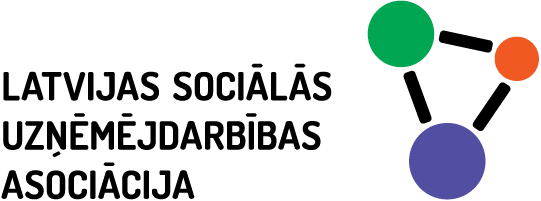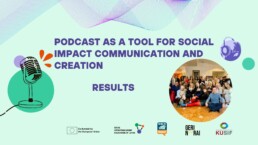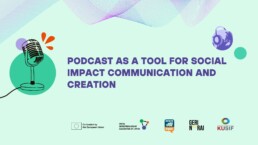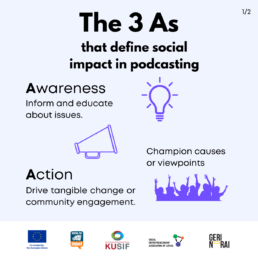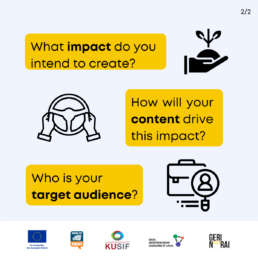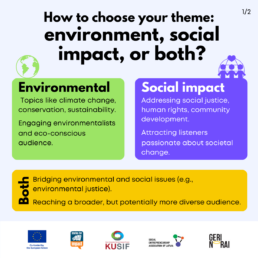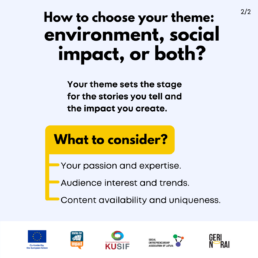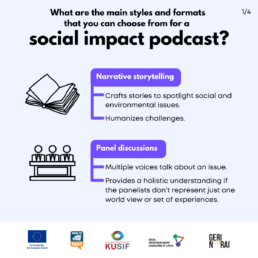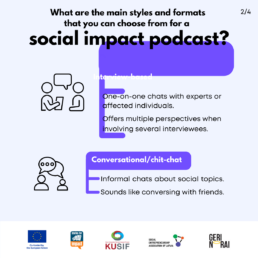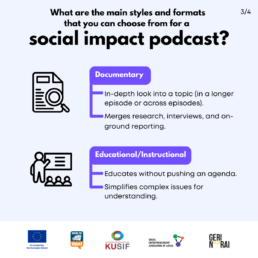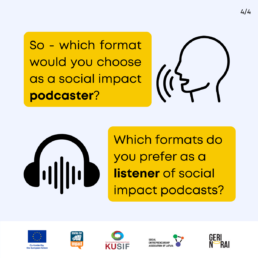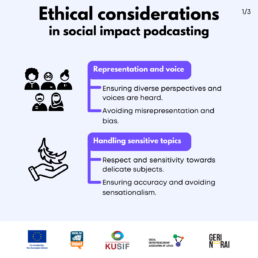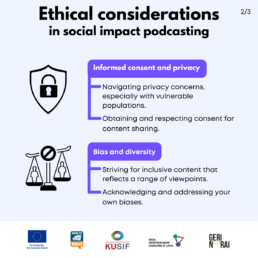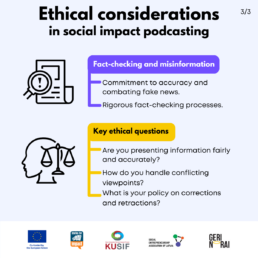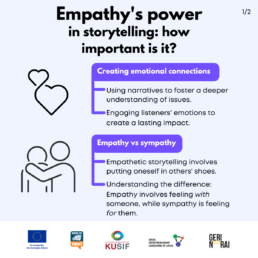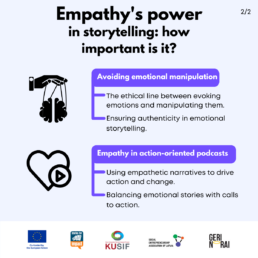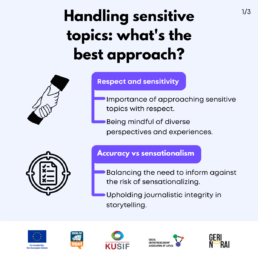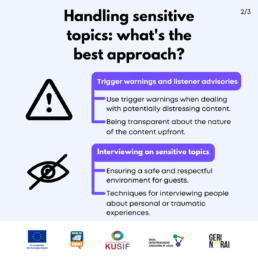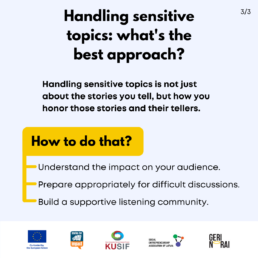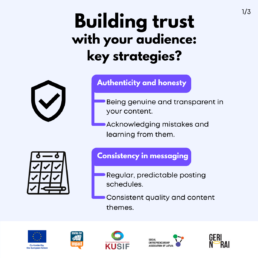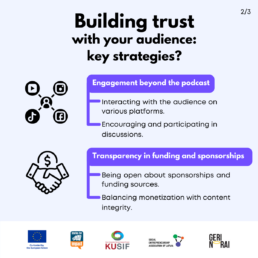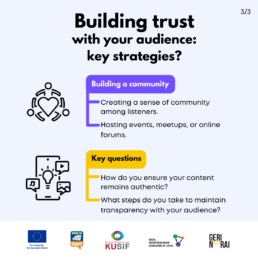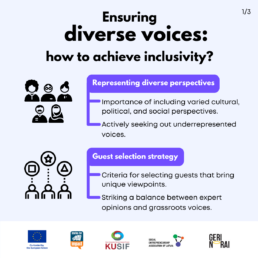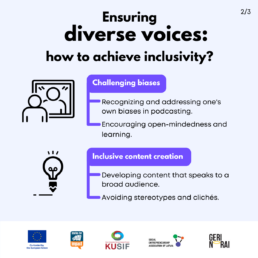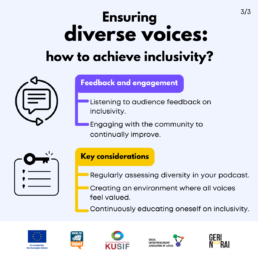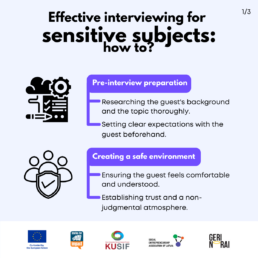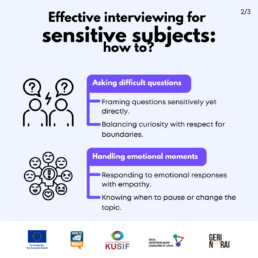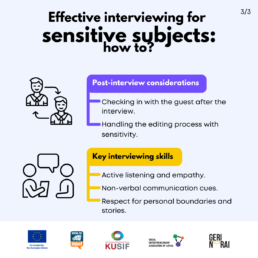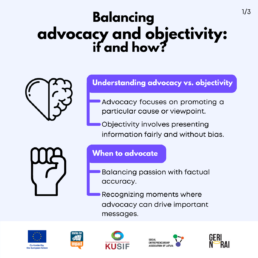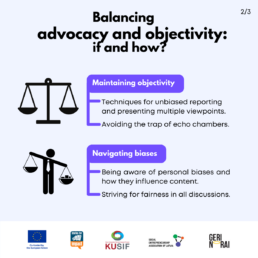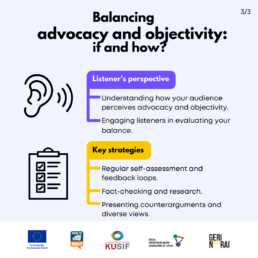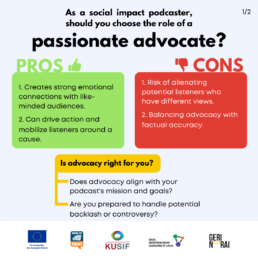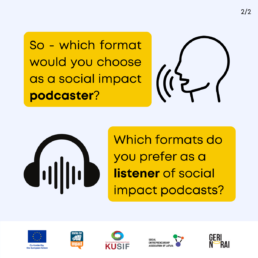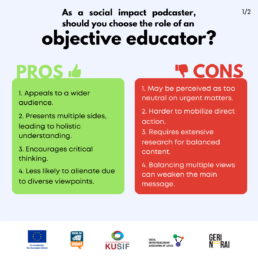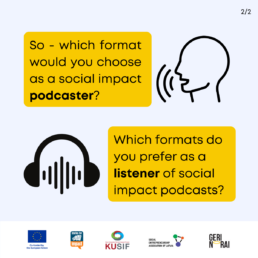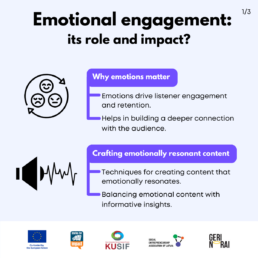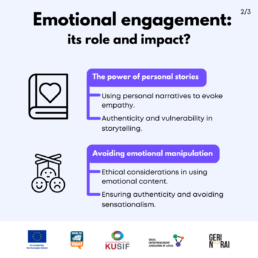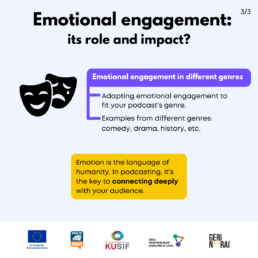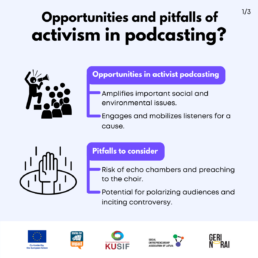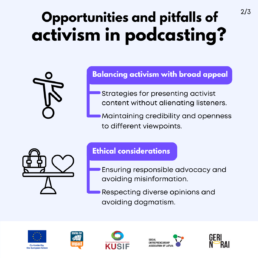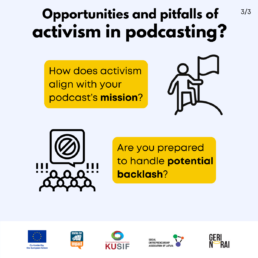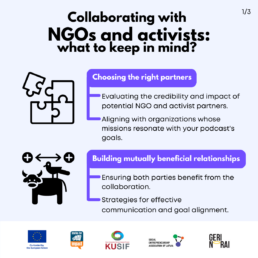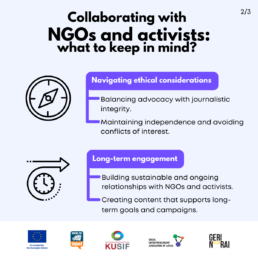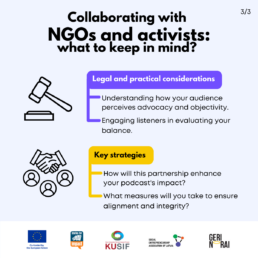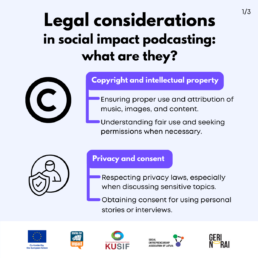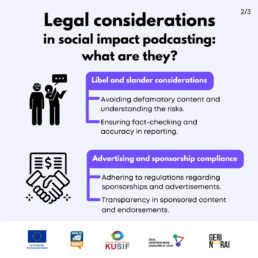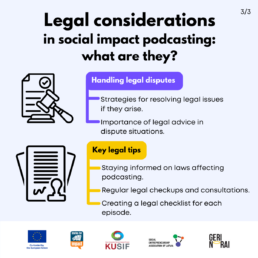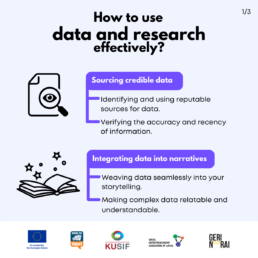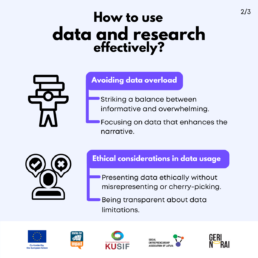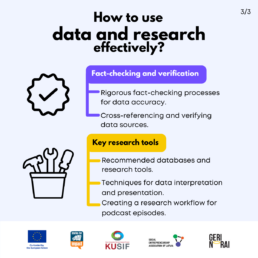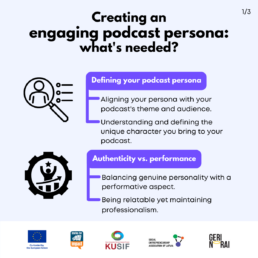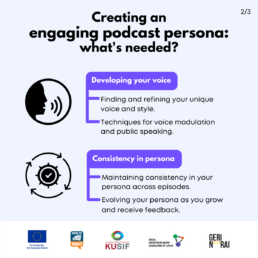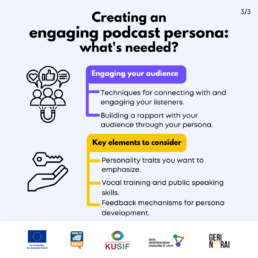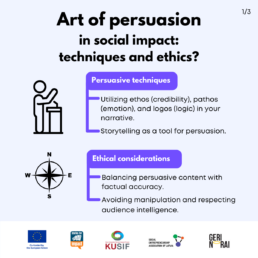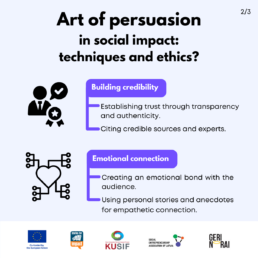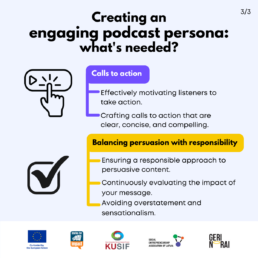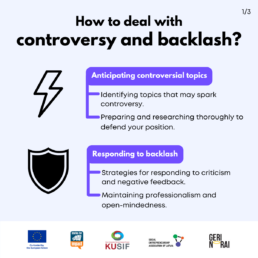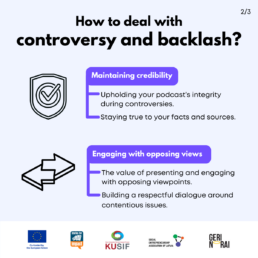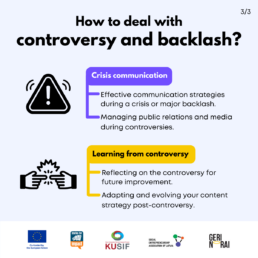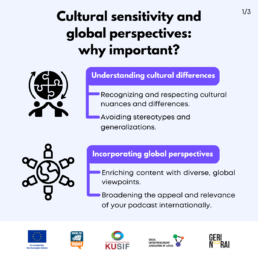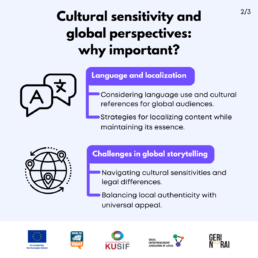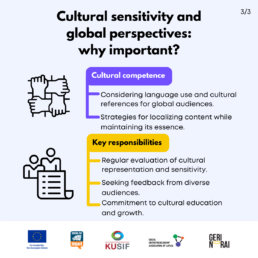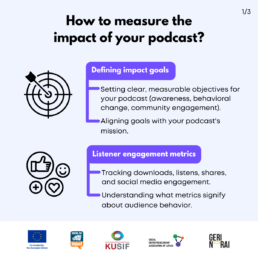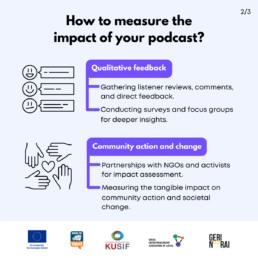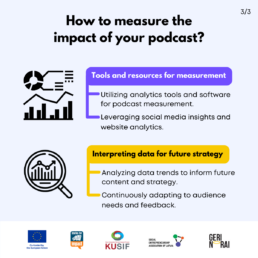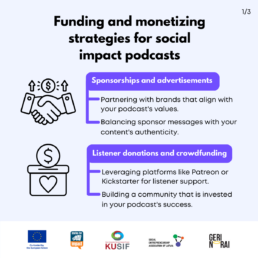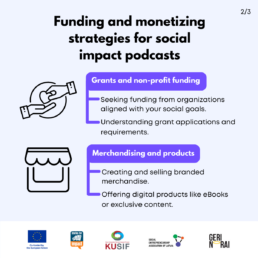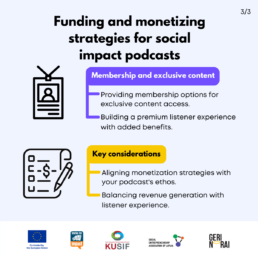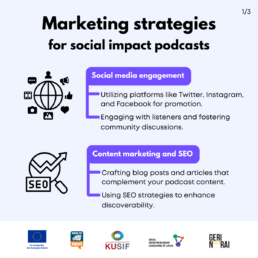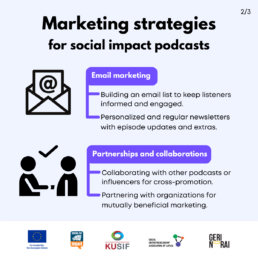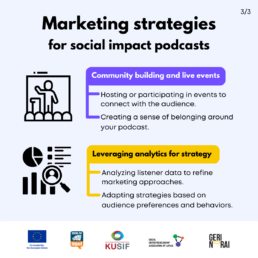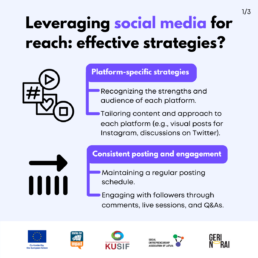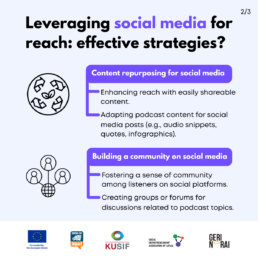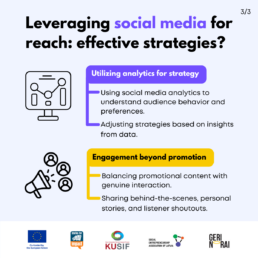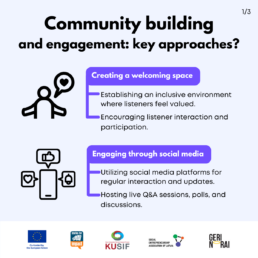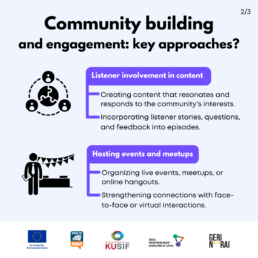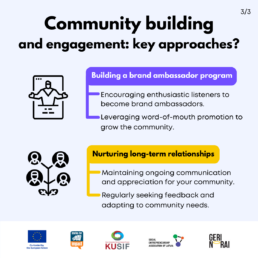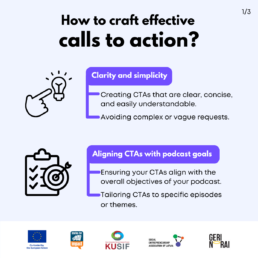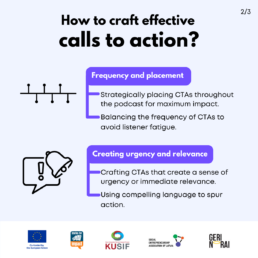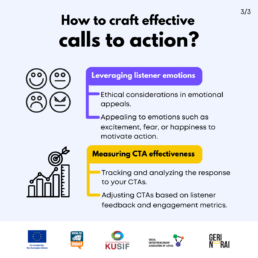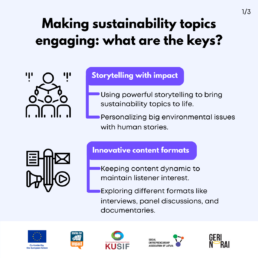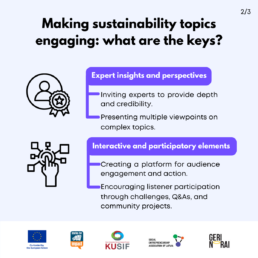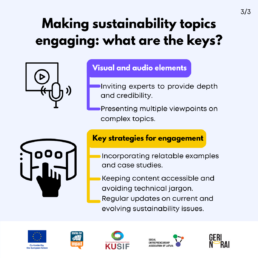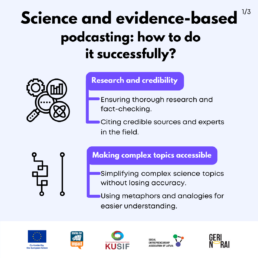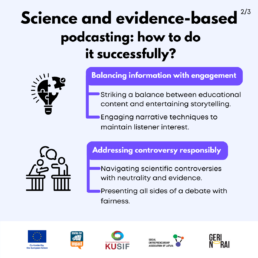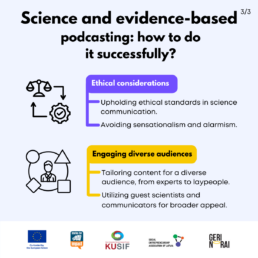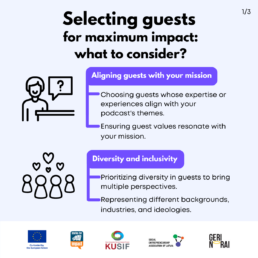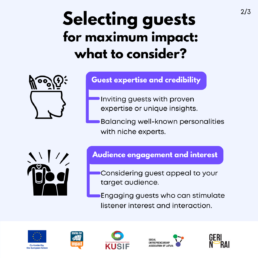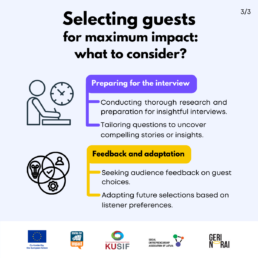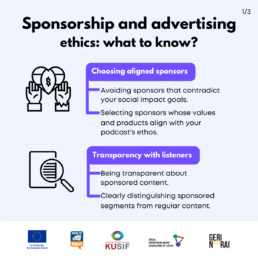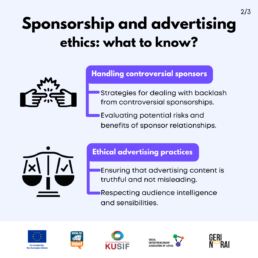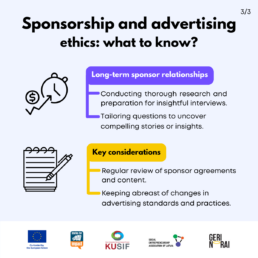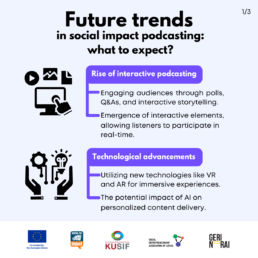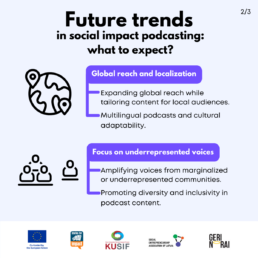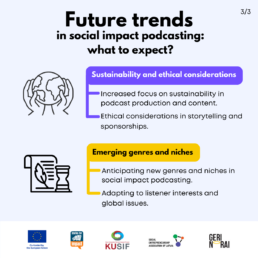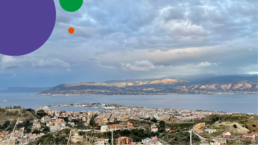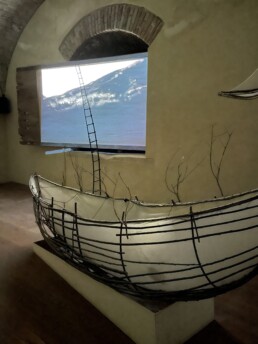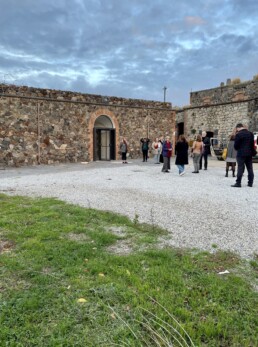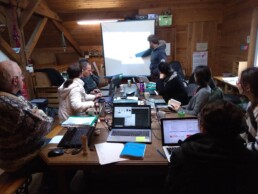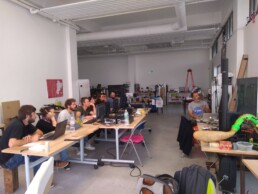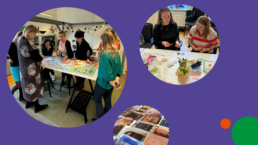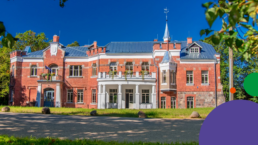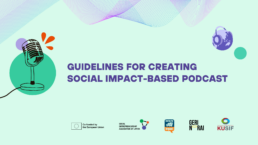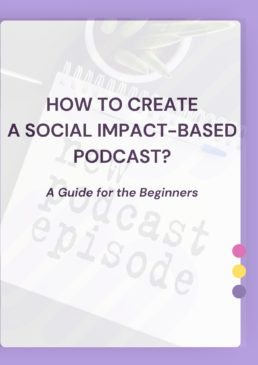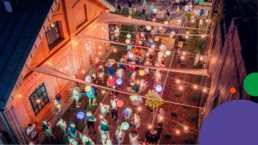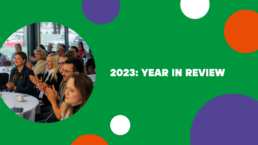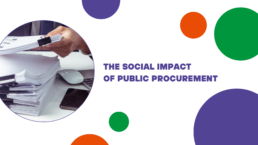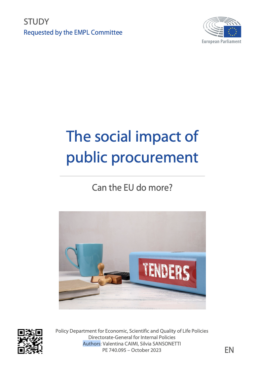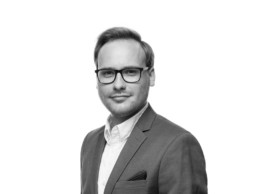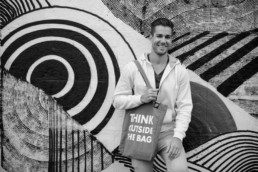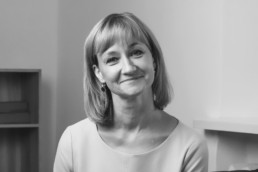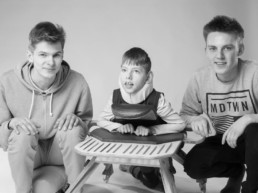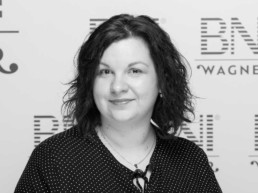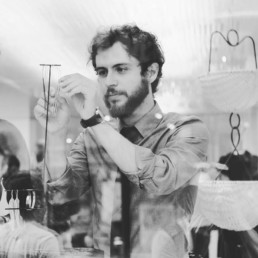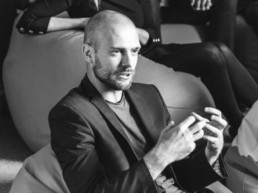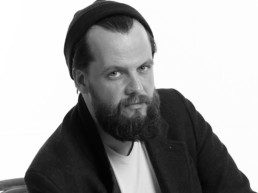How to improve social entrepreneurship ecosystem in Zemgale and Northern Lithuania?
The Social Entrepreneurship Association of Latvia, together with the Zemgale Planning Region, Rokiškis District Municipality, and the Lithuanian Social Business Association, is embarking on the project “Improving the Social Entrepreneurship Ecosystem in Zemgale and Northern Lithuania” (RE:IMPACT) in response to this question.
The role of social entrepreneurs in the Baltic region is becoming increasingly significant in the fight against various societal issues. The Covid-19 pandemic, war in Ukraine, rising prices, and inflation have demonstrated the importance of societal engagement, inclusivity, innovative solutions, and various approaches to addressing these challenges. In such a situation, regional support is particularly crucial because local leaders are the ones who recognize the potential opportunities for utilizing innovative solutions.
Often, national and municipal authorities do not realize possible forms of support for collaboration with social enterprises, and sometimes there is a lack of understanding and motivation to establish such partnerships. According to the European Social Entrepreneurship Survey (2021), the majority of Latvian residents perceive political support for social entrepreneurship as low (25.6%) or even very low (25.6%). Similar results were obtained in Lithuania as well.
Despite Social Entrepreneurship Association of Latvia working closely with various public sector stakeholders, there is still a weak understanding of social innovations, social entrepreneurs, their work, and impact. According to the BRESE report, many social entrepreneurs lack business skills. In both Latvia and Lithuania, the majority of social enterprises have emerged from the non-profit sector and are newcomers to the business sphere. Moreover, the growth of social enterprises is influenced by the size of the national market. This can be particularly observed in areas outside the capital, such as remote districts of Zemgale.
To change the current situation, the goal of the “RE:IMPACT” project is to improve the environment for social entrepreneurship at the regional level – in this project, focusing specifically on Zemgale region and Northern Lithuania. Project partners will promote public sector participation, support measures for social entrepreneurs, develop educational materials for teachers, and inform wider public about social entrepreneurship in general and good regional examples of social entrepreneurs. By doing so, the capacity of social entrepreneurs will increase, which will positively impact local communities on a broader scale.
During the project, it is planned to: identify, map, and assess potential areas for the development of social enterprises; analyze and compare the needs of social enterprises in the Zemgale region and Northern Lithuania; develop practical educational materials on social entrepreneurship for schools and business centers, as well as strengthen the skills of social entrepreneurs and organize experience exchanges.
To achieve these goals, the project is divided into three different stages, each of which will accomplish one of the project’s objectives through various activities.
In the first stage, the status of existing and potential social enterprises will be researched, and educational materials and guidelines will be developed. In the second stage, exchange visits for both social entrepreneurs and public sector representatives will take place, during which participants from Latvia and Lithuania will get to know each other, share their experiences, and learn from each other’s mistakes and success stories to apply the newly gained knowledge in their daily lives. In the final, or third stage, social enterprise stories will be promoted, and an information campaign for the wider public will be conducted.
Currently, we have started actively identifying organizations and individuals working for the common good in the municipalities of Zemgale – Aizkraukle, Dobele, Bauska, Jelgava, Jēkabpils districts, and Jelgava city.
If you know people or organizations implementing activities for the common good in Zemgale, please contact us! Write to or !
The total funding for the project is EUR 595,286. 00. The co-financing of the project from the European Regional Development Fund is EUR 476,228.80. The project implementation period is until January 31, 2026.
For more details about the project, you can visit HERE.
—————————
This publication is prepared with the financial support of the European Union. The content is solely the responsibility of the Social Entrepreneurship Association of Latvia, a partner of the project “Improving the Social Entrepreneurship Ecosystem in Zemgale and Northern Lithuania”, and does not necessarily reflect the official opinion of the European Union.
Podcast as a tool for social impact communication
The concept of social and environmental impact has become increasingly relevant among professionals in various fields in recent years. As early as 2007, it was discovered that podcasts are a powerful tool for presenting complex and interdisciplinary topics to a wider audience.
Each country participating in the “Podcasting based social learning environment” project had its own focus theme for creating podcast episodes. The goal of the Social Entrepreneurship Association of Latvia was to educate a public about social entrepreneurship and to strengthen the activities of social entrepreneurs by interviewing them.
Social Entrepreneurship Association of Latvia, along with three partner organizations from Lithuania, Estonia, and Turkey: Stories For Impact OÜ (EST), Koc University (TR), and VšĮ “Geri norai LT”(LT), concluded the Erasmus+ project “Podcasting based social learning environment” and shares the collected results of the project.
The project started in November 2021, and its main objective was to inspire and train professionals from the public and private sectors who work or are interested in defining, managing, measuring, and communicating the impact of their activities, as well as young people who want to use podcasts as a tool to create communication materials on topics related to human well-being and environmental protection, or to create positive impact and reduce negative impact in society.
Project Results
Series of episodes featuring social entrepreneurs’ stories
In the podcast series featuring social entrepreneurs, both the personal stories of each entrepreneur and various aspects of social entrepreneurship were showcased.
To attract new listeners and inform a wider audience, we collaborated with several podcast creators who discussed various topics. In total, 26 episodes were released, some in video format and others in audio format.
All the entrepreneurs’ stories in latvian can be found HERE.
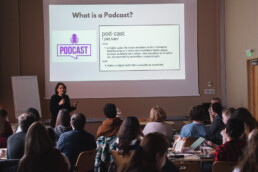
Handbook: How to Create a Social Impact Podcast
Throughout the “Podcasting based social learning environment” project, an educational yet easily understandable material was created, providing recommendations on how to create your own social impact podcast as successfully as possible.
The material is organized into various thematic sections and provides advice on how to choose your podcast’s topic and communicate with your audience, as well as how to attract sponsors and analyze data.
You can view the compilation of recommendations HERE!
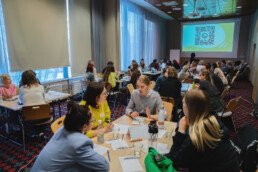
Guidelines for Creating a Podcast
If you have a desire to start your own social impact podcast but don’t know where to begin, then during this project, we also developed guidelines with recommendations for starting a podcast.
How to assess resources and plan the creation of your podcast? Is it necessary to immediately purchase expensive equipment, or can you get by with the technology available at home?
These and other questions are answered in the guidelines developed during our project, which can be viewed HERE.
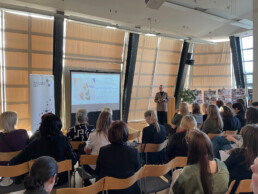
This article has been created within the framework of the Podcasting-based social impact learning environment project, co-financed by the European Union’s Erasmus+ program.
The project is being implemented in collaboration with Stories for Impact, Koç University Social Impact Forum – KUSIF, and Gerinorai.lt.
How to create your own social impact podcast?
The main goal of the project “Podcasting based social learning environment” is to inspire and train professionals from both the public and private sectors who are working or interested in defining, managing, measuring, and communicating the impact of their actions, as well as young people who want to use podcasts as a tool to create communication materials on topics related to people well-being and environmental protection or to create positive impact and reduce negative impact in society.
We invite you to take a look on the materials developed in the project!
A cluster approach in regenerative projects
Creating an enabling environment for successful and sustainable regeneration projects based on the cluster approach requires collaborative actions among diverse stakeholders, including public authorities, third-sector organisations, academia, and policy-makers. Social economy clusters link a unique membership composition to social and ecological innovation objectives and this approach combines the power of clusters with the forward-thinking principles of the New European Bauhaus to drive innovation and progress in a regenerative way.
Two excellent case studies like Roccavaldina and PLOUCS highlight the transformative power of clusters. These examples emphasise inclusive collaboration among businesses, SMEs, chambers of commerce and incubators. This approach prioritises sustainable and inclusive business models rooted in local communities. Moreover, such policy implications like the Social Economy Action Plan, Clusters for Social and Ecological Innovation and others serve as a guide for fostering transformative, inclusive, and aesthetically pleasing developments aligned with the New European Bauhaus vision.
Through analysis of such case studies it was agreed that stakeholder engagement, governance challenges, and financial sustainability as well as the need for inclusive, sustainable, and accountable regeneration efforts involving diverse partnerships is an essential part to implement regenerative projects successfully.
The Roccavaldina initiative, Italy
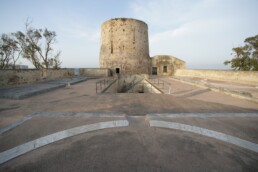
Roccavaldina is a village in Sicily of great historical and architectural value, located in a position of great scenic beauty overlooking the Gulf of Milazzo and the Aeolian Islands like a terrace. The great paradox of the socio-economic profile of the area lies in the fact that in contrast to the factors of identity, there is a deep social and economic fragmentation that is closely correlated with the progressive processes of decline.
The Roccavaldina initiative aims to establish a Park of Beauty and Science (PBS) with a holistic and interconnected approach, focusing on new biomaterials and bioplastics from circular economies. The project has three key components: rehabilitating an abandoned craftwork area, enhancing the architectural heritage, and reforestation for zero emissions. The transformation of an abandoned handicraft centre into a hub for research, training, and production involves the creation of a research centre, a bioplastics factory, and a lab for innovation. The synergy involves a public private partnership, attracting talents, and aligning with New European Bauhaus principles.
The organisational model involves collaboration between the municipality, MeSSInA Foundation, Ecos-Med Social Cooperative, and Horcynus Orca Foundation, following a participatory democratic process for strategic planning. The initiative creates opportunities for economic development, inclusiveness, and environmental responsibility and building cohesion through shared social norms and cooperation networks. The initiative aims to create co-working centres, educational-industrial centres, bio-plastic factories, and artistic/educational workshops to contribute to economic development, social cohesion, and cultural promotion in the Roccavaldina community.
There are several important links with the New European Bauhaus Initiative. Roccavaldina focuses on an ecosystemic approach, aesthetically enhancing local buildings through land art and promoting biodiversity preservation. The planting of over 2000 trees in a former landfill not only contributes to carbon negativity but also extends collective care beyond the human community. The circular economy hub’s role is to be a centre for green job training and upskilling, emphasising lifelong learning opportunities for vulnerable groups. A centre for social inclusion is providing a need based employment opportunities for vulnerable groups, including people with disabilities. This transformative approach integrates closely with the local municipality, acting as an intermediary in identifying beneficiaries and determining accessibility criteria. The engagement of local actors occurs at three levels: cluster members supporting identification and co-design, the local community participating in the regeneration process, and a mutual exchange partnership with the local municipality.
Read more about the good practice – the Roccavaldina initiative
PLOUCS, France
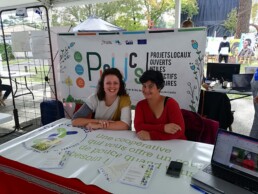
PLOUCS, the association for the development of the social and solidarity economy (SSE) in the Landes founded in 2017, was born out of the initiative of a group of players committed to promoting the SSE in this area of south-west France. The Landes département, while offering great economic and natural diversity, was facing socio-economic challenges, notably unemployment and precariousness in some rural areas.
It comprises about 20 local SSE structures governed cooperatively and consisting entirely of legal entities. PLOUCS engages in various activities, including its SSE project incubator that provides project leaders with consulting, training, and co-working spaces funded by European and regional support. The organisation also develops educational tools, like the Kess’Essa game, which raises awareness of SSE and receives funding from the Landes department and regional sources.
PLOUCS drives the “Coopératives Jeunesse de Services” initiative, allowing young people aged 16 to 20 to engage in cooperative projects during the summer. It facilitates networking and cooperation between SSE actors, local authorities, and educational partners funded by the SSE region. The organisation is essential to promoting the SSE, supporting social entrepreneurs, raising awareness, and creating opportunities for youth involvement in cooperative projects. In so doing, PLOUCS contributes significantly to the economic and social development of the region.
PLOUCS demonstrates a strong alignment with the New European Bauhaus (NEB) values, showcasing its commitment to integrating arts and culture, closing the loop through circular economy practices, and fostering social inclusion. In detail, PLOUCS practises participatory co-development with participative governance structures, working globally and embracing a multidisciplinary approach. Specifically, PLOUCS promotes art dissemination through Landes’Art, engages in circular economy and sustainable agriculture projects, prioritises social inclusion in its initiatives, and actively participates in national and international collaborations, including knowledge exchange with European clusters. PLOUCS’s efforts exemplify the principles of the NEB Compass, making it a noteworthy contributor to the vision of a more sustainable, inclusive, and aesthetically pleasing future.
Read more about the good practice – PLOUCS, France
Key Aspects for Success
The peer review discussions within the working groups have provided valuable insights into critical aspects of stakeholder engagement, governance challenges, and financial sustainability inherent in regional regeneration projects, with a specific focus on diverse cluster models. The overarching objective is to foster the development of self-sustainable projects capable of generating financial resources, ensuring the enduring viability of regional regeneration initiatives within the cluster framework.
- Financial sustainability: It is important to diversify funding sources beyond initial public investments, to search for innovative approaches, particularly embracing a cluster-based strategy for sustainable development, for example, virtual currencies not only as a medium of financial exchange but also as a tool for fostering a collaborative economic system.
- Inclusive stakeholder engagement: Stakeholders from public authorities, third-sector organisations, academia, and policy-makers should collectively mandate and facilitate inclusive stakeholder engagement models, such as co-design and co-planning particularly involving the community. Ensure diverse partnerships involving communities, social economy ecosystems, and academia.
- Transparent communication and governance: Transparent communication, robust feedback mechanisms, and conflict resolution strategies are crucial for successful management and governance in cluster-based regeneration projects.
Read more about these aspects as well as the summary of good practices – The Roccavaldina initiative in Italy and PLOUCS in France
The social economy missions were organised in the framework of project ‘SEA4NEB’ that aims at promoting social economy models to contribute to the New European Bauhaus and at how they can foster spatial and sectoral clusters, taking an ecological approach to cultural cooperation and territorial development with local authorities. The whole methodology of the project is based on a strong partnership at local level between the local authority and the SE actor, while Diesis Network will act as transnational facilitator and coordinator.
Funded by the European Union. Views and opinions expressed are, however, solely those of the authors and do not necessarily reflect those of the European Union or EISMEA. Neither the European Union nor the granting authority can be held responsible for them.
Gamified Social Entrepreneurship Educational Approach
In today’s fast-paced and entertaining digital world, it is crucial to reevaluate traditional education methods and make learning more accessible and understandable in both formal and non-formal education. There is a need for innovative approaches to make learning more engaging, effective, and enjoyable, as traditional classroom methods may not always resonate with students and do not offer engaging experience. The changes in the society, especially after recent challenges the world is facing such as Covid-19 pandemic and the wars in Ukraine and Gaza have directly affected the work. Moreover, everyone should have an opportunity to explore their ideas of how society and communities can help one another, irrespective of the obstacles they may face. Entrepreneurship skills are valuable not only for aspiring entrepreneurs, but for anyone seeking to navigate the challenges of the modern world. It is essential to expand awareness of various social challenges and social entrepreneurship can be used as a powerful tool for addressing these issues to a broader audience. Game based learning offers a fresh and interactive way to teach complex subjects, to actively engage with the subject and inspire learners.
Social Entrepreneurship Association of Latvia together with Social Enterprise Alliance (SEA) from Georgia, Tudatos Ifjúságért Alapítvány (TIA) from Hungary, CXJV Conexão Jovem Associação (CJ) from Portugal and Izglītojošo spēļu un metožu asociācija (ISMA) from Latvia have started a cooperation to explore fresh unconventional methods and to create an engaging and intuitive learning experience that can be easily adopted and understood by diverse audiences by using gamification as a tool within the project “ImpactED: Gamified Social Entrepreneurship Educational Approach” that will last until June 2025.
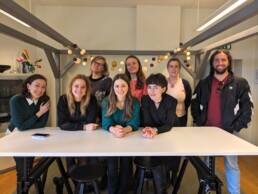
The objective of the cooperation is to explore and demonstrate how gamification can be effectively employed to enhance non- formal education and the learning process, specifically in the context of social entrepreneurship field as well as to contribute to the broader discussion on innovative educational approaches that not only make learning more enjoyable, but also equip learners with the skills and knowledge necessary to address pressing societal challenges through social entrepreneurship.
The project will implement a series of activities focused on developing innovative gamified educational materials for social entrepreneurship, including designing an interactive social entrepreneurship game, testing, creating guidelines and a video. These activities will actively engage young people to explore entrepreneurial opportunities that address societal issues and become more responsible citizens as well as social entrepreneurs to show their solutions as an example. The main result of the project will be an engaging and innovative educational game that can be used both in formal and non- formal education context, as well as youth training.
The impact of the cooperation and project results are aimed towards providing young people with sustainable problem-solving skills, empowering young individuals to address social issues effectively in the long term. As a result they will expand their capacities, particularly in critical thinking and problem-solving. This shift from theoretical learning to practical application will enable them to adapt and respond to emerging challenges with resilience and creativity in the future. It will enhance the quality of youth education, promote social entrepreneurship, and foster civic engagement.
Co-funded by the European Union. Views and opinions expressed are however those of the author(s) only and do not necessarily reflect those of the European Union, European Commission or Agency of International Programs for Youth. Neither the European Union nor the granting authority can be held responsible for them.

Revitalising Rural Europe
The New European Bauhaus initiative emphasises the concept of “Regaining a sense of belonging” and focuses on preserving cultural heritage, integrating sustainable development principles, and involving local communities for socio-economic benefits. Two excellent examples of rural regeneration practices that align with these principles are Lūznava Manor in Latvia and The Whole Village in Romania.
Both initiatives are closely aligned with the New European Bauhaus values. Lūznava Manor embodies beauty, sustainability and regenerative practices. The Whole Village concept connects communities, prioritising sustainability, cultural heritage preservation and inclusive living. Both projects actively involve local communities, fostering collaboration, and addressing complex challenges in a transdisciplinary manner.
Lūznava Manor in Rēzekne, Latvia
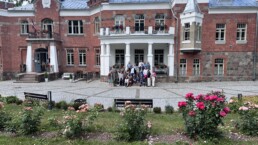
Lūznava Manor stands as a testament to cultural revitalization and community development. Through meticulous restoration and collaborative strategies, the manor has become a cultural and social hub, contributing to the economic and social renaissance of the rural Latgale region. By repurposing historic buildings, engaging the local community, and championing sustainable nature management practices, Lūznava Manor has become a successful model of rural regeneration, aligned with the values of the New European Bauhaus.
The manor has already hosted 1,373 events and welcomed 113,000 visitors from 52 countries in the last three years, showcasing its transformative potential. Noteworthy achievements include repurposing historical buildings into dynamic cultural spaces, establishing a children’s playground, implementing residency programs for artists, and fostering a rich tapestry of creativity within the community. The inclusive role played by Lūznava Manor as a cultural hub is pivotal, fostering community bonds and providing a platform for social entrepreneurship to thrive. The project’s success is deeply rooted in a collaborative strategy that engages the local community, entrepreneurs and regional organisations, fostering inclusiveness and challenging discriminatory practices, trying to develop a new way of living together. Despite financial challenges, the manor is a compelling example of the transformative potential inherent in cultural revitalisation, showcasing its positive impact on rural regeneration and sustainable community development.
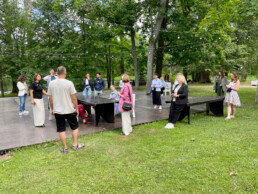
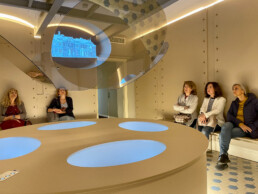
The Lūznava project, under the beautiful value, embodies the Bauhaus concept of beauty by integrating cultural and social values into the restoration of the main building. Modern IT solutions provide an interactive experience with authentic cultural heritage, promoting a sense of community through various cultural activities.
Read more about the good practice – Lūznava Manor in Latvia
The Whole Village Concept in Romania
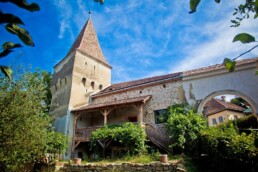
The Whole Village concept focuses on the comprehensive restoration of cultural and natural heritage in Transylvanian rural areas. “Mihai Eminescu Trust” (MET) community-centric approach addresses depopulation and unemployment, resulting in the restoration of historic structures, tree planting, job creation, and cultural and eco-tourism development. The project is aligned with the New European Bauhaus values, promoting sustainability, heritage preservation, and inclusive community development.
MET’s remarkable achievements include successfully restoring 700 historic structures, planting three million trees, and creating 100 jobs, along with providing 140 seasonal opportunities during the peak tourist season. The initiative strategically leverages cultural and natural heritage to encourage tourism as a sustainable source of income for rural families. Beyond physical restoration, MET’s focus extends to community empowerment, education, and supporting local businesses. With an emphasis on inclusiveness, the initiative selects project leaders and teams, provides training, supports local entrepreneurs, and continually adapts for improvement. The project’s goal is to enable local communities to govern themselves, but cultural and historical factors are currently impeding progress.
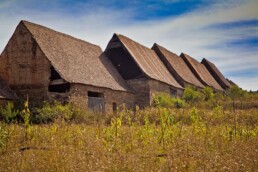
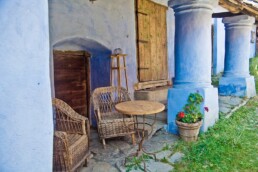
The Whole Village project aims to connect various communities and individuals, fostering a sense of belonging and enhancing lives through meaningful social interactions and shared experiences. The project combines cultural and natural heritage to develop sustainable cultural tourism, create revenue for rural families, and improve their quality of life. Under the value of sustainability, the project is committed to regenerating and preserving cultural landscapes, promoting both agricultural heritage and tourism, and encouraging sustainable practices, such as sustainable tourism. Regarding building restoration, the project prioritises using sustainable materials and techniques while promoting traditional materials and involving skilled artisans.
The project’s efforts have yielded positive transformations, including increased educational levels, improved quality of life, and a shift towards sustainable practices and cultural preservation.
Read more about the good practice – The Whole Village in Romania
Key Aspects for Success:
By integrating creative and artistic industries with social economy organisations, it is possible to create clusters that promote specialised, integrated, multifunctional, and complementary economic activities. As in ecological systems, learning and adaptation are essential for survival and sustainability. Both initiatives prioritise the crucial concept of “belonging” in their rural regeneration and community revitalisation strategies. They achieve this by emphasising the preservation and restoration of cultural heritage sites to revitalise rural areas and contribute to overall development.
For such projects to be successful, several aspects are crucial:
- Financial sustainability: Rethinking financing approaches and innovative financing models are essential for long-term impact.
- Stakeholder engagement: Effective stakeholder engagement is pivotal, especially in rural areas and partnerships involving diverse stakeholders from the public and social economy sectors.
- Leadership in rural areas: Strong leadership is necessary to drive these initiatives forward.
- Self-driven co-creation models: Encouraging self-driven co-creation models can foster effective governance.
- Governance structure based on values: A governance structure based on values can help navigate complexities and ensure sustainable impact.
Read more about these aspects as well as the summary of good practices – Lūznava Manor in Latvia and The Whole Village in Romania
In conclusion, Lūznava Manor and The Whole Village are excellent examples of rural regeneration practices that align with the New European Bauhaus concept. By preserving cultural heritage, integrating sustainable development principles, and involving local communities, these initiatives contribute to socio-economic benefits and foster a sense of belonging in rural areas.
The social economy missions were organised in the framework of project ‘SEA4NEB’ that aims at promoting social economy models to contribute to the New European Bauhaus and at how they can foster spatial and sectoral clusters, taking an ecological approach to cultural cooperation and territorial development with local authorities. The whole methodology of the project is based on a strong partnership at local level between the local authority and the SE actor, while Diesis Network will act as transnational facilitator and coordinator.
Funded by the European Union. Views and opinions expressed are, however, solely those of the authors and do not necessarily reflect those of the European Union or EISMEA. Neither the European Union nor the granting authority can be held responsible for them.
Guidelines for creating social impact based podcasts
Have you ever thought you need your own podcast but don’t know where to start? How do you identify resources and plan your podcast? Do you need to buy expensive equipment straight away or can you get by with the equipment you have at home? Find out in the How to create a social impact-based podcast guide, which will help you take the first steps towards creating your own podcast!
The guidelines have been developed as part of the project “Podcasting-based social learning environment project”, which aims to inspire and train public and private sector professionals working or interested in defining, managing, measuring and communicating their impact, as well as anyone who wants to use a podcast as a tool to create positive impact and reduce negative impact in society.
Regenerative projects - revitalising disused areas
New European Bauhaus acts as a bridge between the world of science and technology and the world of art and culture to re-think the opportunities green and digital challenges could bring to our lives. Exploring various examples of social economy models and their development can foster understanding the New European Bauhaus principles as well as implementing them in a broader perspective.
Two good practices – The Split Youth Centre in Croatia and the Living Factory in Poland, of urban regeneration were analysed using peer review methodology and they showed some notable examples of community involvement, sustainable living and creative integration.
The Split Youth Centre and the Living Factory are two projects that align with the principles of the New European Bauhaus and could serve as inspiration for future urban regeneration and community development. These are transformative initiatives that have breathed new life into once-neglected spaces, showcasing the seamless integration of community engagement, sustainable living and creative ingenuity.
The Split Youth Centre in Split, Croatia
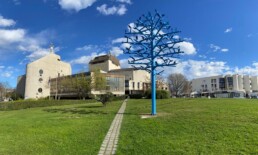
The Split Youth Centre in Split, Croatia aims to transform disused infrastructure into a functional co-creative space for various activities such as work, culture, creativity, sports and recreation. It seeks to improve the quality of life for local youth, artists, hobbyists, cultural and social activists, and the community by providing diverse programmes and events. The project addresses the need to revitalise unused infrastructure and promote artistic, creative and social engagement among the local community, particularly youth. Collaboration is at the heart of Youth Centre, as 28 public, civic and private organisations join forces to revitalise the neglected space. With hundreds of programmes and activities held throughout the year, more than 2,000 hours annually, the project has undeniably enriched the quality of life within the local community.
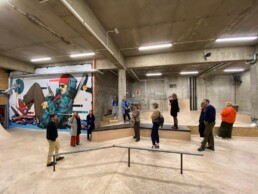
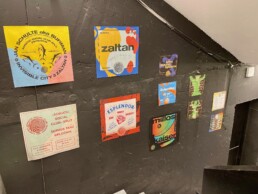
It resonates with the principles of the New European Bauhaus initiative, incorporating inclusive decision-making through collaborative governance. As a vibrant centre for creativity and community, it offers valuable inspiration for similar regional projects, proving the profound impact of revitalising spaces and nurturing the human spirit, one programme at a time.
Read more about the good practice – Split Youth Centre
The Living Factory Dąbrowa Górnicza, Poland
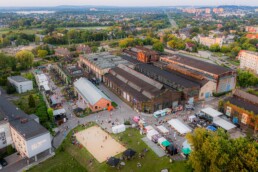
The Living Factory, situated in Dąbrowa Górnicza, Poland, is embarking on a remarkable journey of revitalising the former industrial area, carving out a vibrant centre that thrives on locally and socially rooted entrepreneurship. Grounded in the community’s needs, the Living Factory addresses the region’s pressing issue of economic transformation. With the mining industry’s decline, the project offers hope by fostering local entrepreneurship and generating job opportunities for those impacted by industry changes.
The Living Factory functions as a business incubator, bringing together social and economic partners to collaborate and create new businesses. The project advocates the potential of cooperatives to create job opportunities for individuals transitioning out of mining and mining-related industries. Comprehensive training programmes, mentoring and vital capital support are offered to budding entrepreneurs to help them realise their dreams.
The Living Factory project reflects the NEB initiative’s emphasis on economic transformation, sustainable living, and cooperation between different sectors.
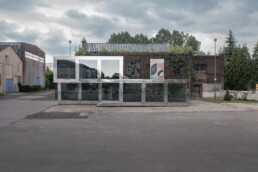
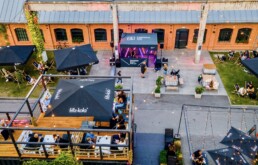
Read more about the good practice – Living Factory
Representatives of several social economy organisations from Latvia, Italy, Croatia and Belgium analysed these good practices, using peer review. A peer review is a mutual and voluntary learning process between well-qualified equals based on systematic exchange of experiences and evaluation of policies, actions, programmes or institutional arrangements. The presented comment papers and peer review working groups provided valuable insights into important aspects of:
- Financial sustainability
- Ensuring Effective and Efficient Use of Public Funds
- Harnessing Innovative Strategies for Income Generation
- Leveraging Alternative Funding Sources
- Stakeholder engagement and collaborative partnerships
- Diverse Stakeholder Engagement Models
- Role of Social Economy
- Strengthening Collaborative Partnerships
- Effective management and governance
- Governance Models for Regeneration Projects
- Capacity building for urban regeneration
- Sustainability and Impact Management
Read more about these aspects as well as the summary of good practices – The Split Youth Centre in Croatia and the Living Factory in Poland
The social economy missions were organised in the framework of project ‘SEA4NEB’ that aims at promoting social economy models to contribute to the New European Bauhaus and at how they can foster spatial and sectoral clusters, taking an ecological approach to cultural cooperation and territorial development with local authorities. The whole methodology of the project is based on a strong partnership at local level between the local authority and the SE actor, while Diesis Network will act as transnational facilitator and coordinator.
Funded by the European Union. Views and opinions expressed are, however, solely those of the authors and do not necessarily reflect those of the European Union or EISMEA. Neither the European Union nor the granting authority can be held responsible for them.
Activity report of year 2023
2023 was a very intense, fast-paced and full year! Our scale this year went beyond all frameworks – with the number of events, partners and countries, the diversity and depth of topics – from organising the two-day stage at Conversation Festival “LAMPA”, to international visits and trainings, consulting and running conferences and spending many hours in online meetings.
In 2023, we put a lot of effort into ensuring that social enterprises have an increasingly supportive environment, support mechanisms and opportunities to thrive. The Social Entrepreneurship Association of Latvia continues to develop social entrepreneurship for long-term change in Latvia, working in three main areas – public awareness, capacity building of members and advocacy. Here is a look back at the most important milestones of the past year!
————–
MOST IMPORTANT EVENTS IN 2023
Social entrepreneurship pitch competition “LET THE GOOD IDEAS GROW“
The Social Entrepreneurship Association of Latvia has organised the social entrepreneurship idea competition “LET THE GOOD IDEAS GROW” for the fifth time. This year the competition was held in cooperation with Luminor bank, as well as the Development Finance Institution ALTUM and the charity shop “Otrā Elpā”. We had two winners, each of whom received EUR 4000 prize. Each year, the competition is open to existing and aspiring social entrepreneurs from all over Latvia who need funding to implement a new social entrepreneurship idea or an existing project. The final of “LET THE GOOD IDEAS GROW” was broadcasted live on Delfi.lv.


In 2023, the prizes were awarded to:
🏆 Jury’s vote – “Is it easy to put on trousers?” / Vilber’s adaptive / Ogre region – Zane Berzina
🏆 In the audience voting – “BJMK Rokskola” / BJMK / Jelgava city – Zane Rožkalna
🏆 Luminor bank Sympathy Award Winner – Brand “PARTAPIS” / Kristīne Kalēja – textile recycling in design clothing
🏆 ALTUM Sympathy Award Winner – LeatherWorks / Madara Miltoviča – natural leather scrap workshop
🏆 “Otrā Elpa” Sympathy Award Winner – “Remontbufete” / Zane Ruģēna – repair and building materials exchange

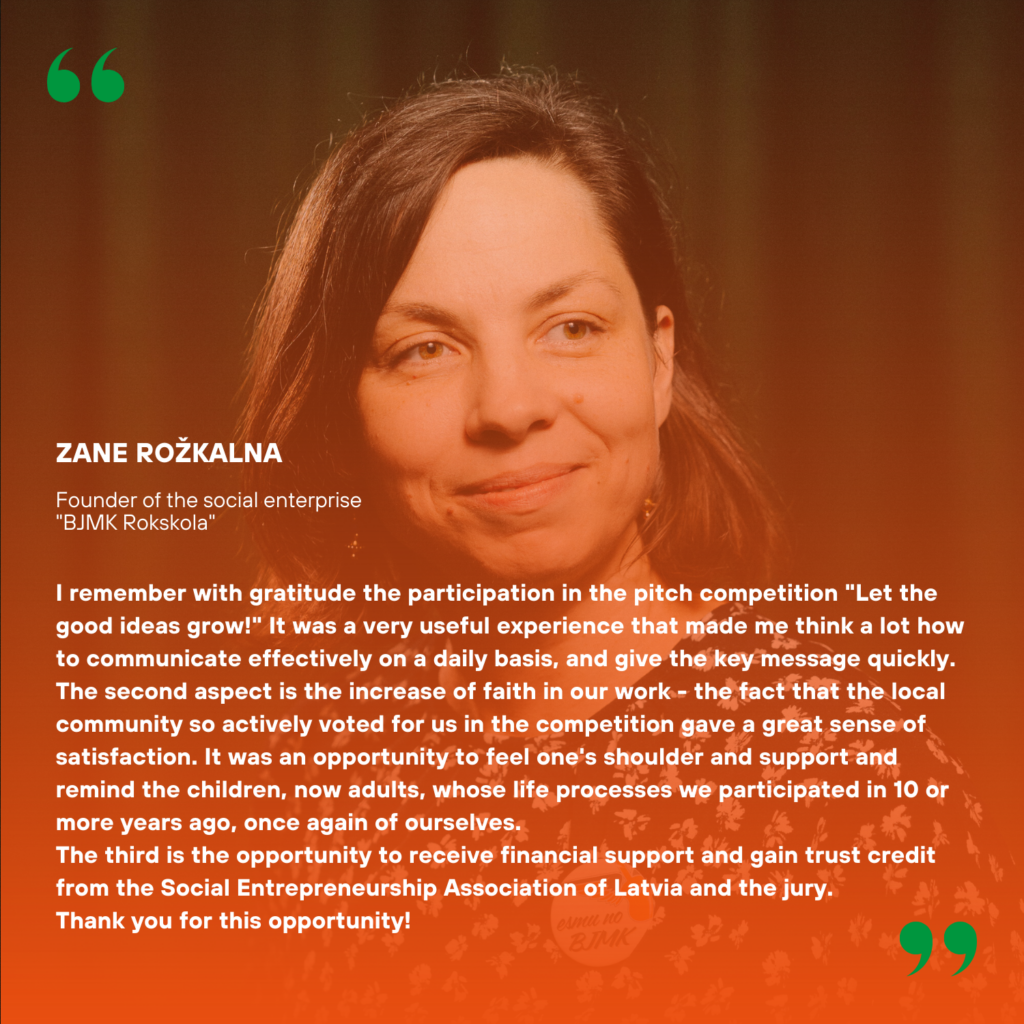
***
Conference “Be proud. Evaluate. Celebrate!”
In 2023, the social entrepreneurship sector in Latvia officially turned five years old. During this time, a lot has been achieved: the legal framework has been established and strengthened, public awareness of the importance of social entrepreneurship has been raised, public investment has contributed to the development and growth of social enterprises. Today, more than 200 enterprises with social enterprise status are active, but the reality is that there are many more.
📣 On October 12, together with the Ministry of Welfare, we organised a conference dedicated to the five-year anniversary of social entrepreneurship, “Be proud. Evaluate. Celebrate!”.
The Ministry of Welfare, ALTUM and social entrepreneurship support organisations – Social Entrepreneurship Association of Latvia, Reach for Change Latvia and New Door – as well as social entrepreneurs themselves shared their stories about their achievements.
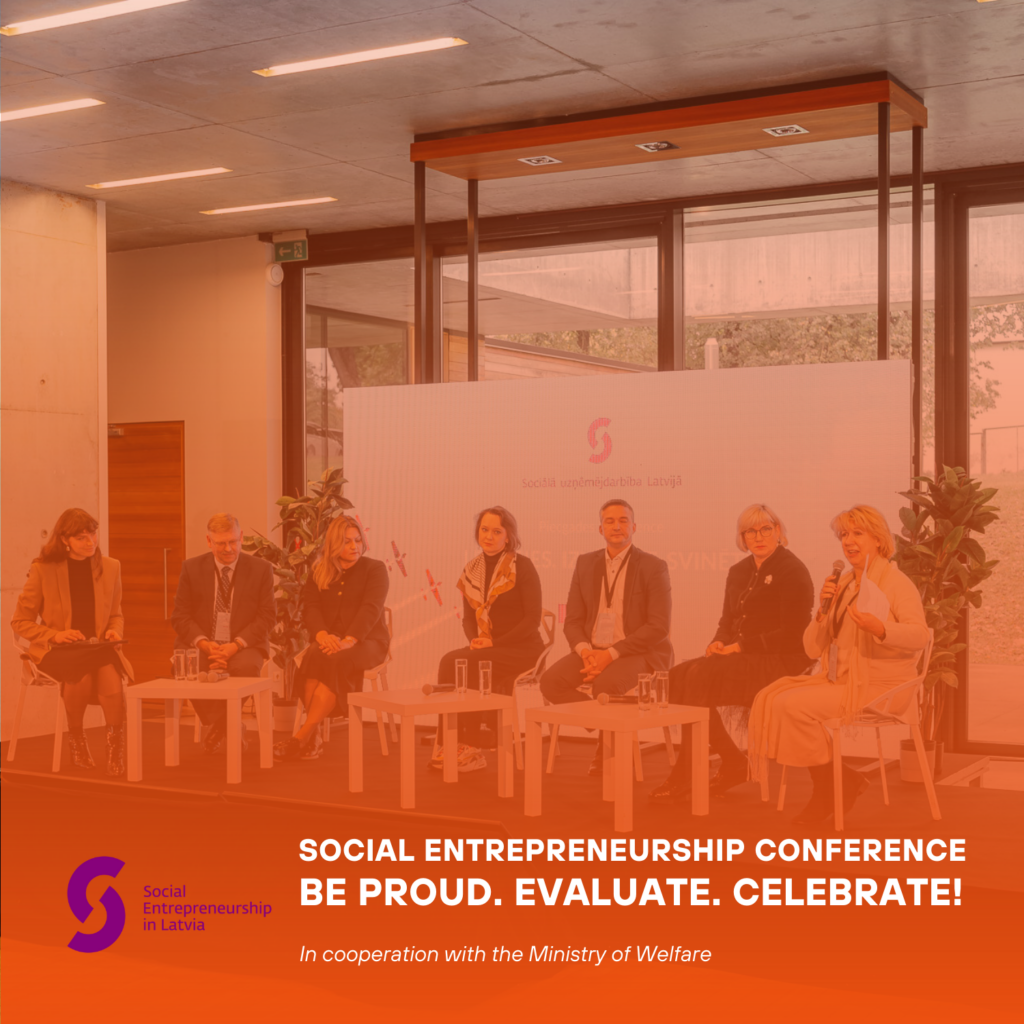
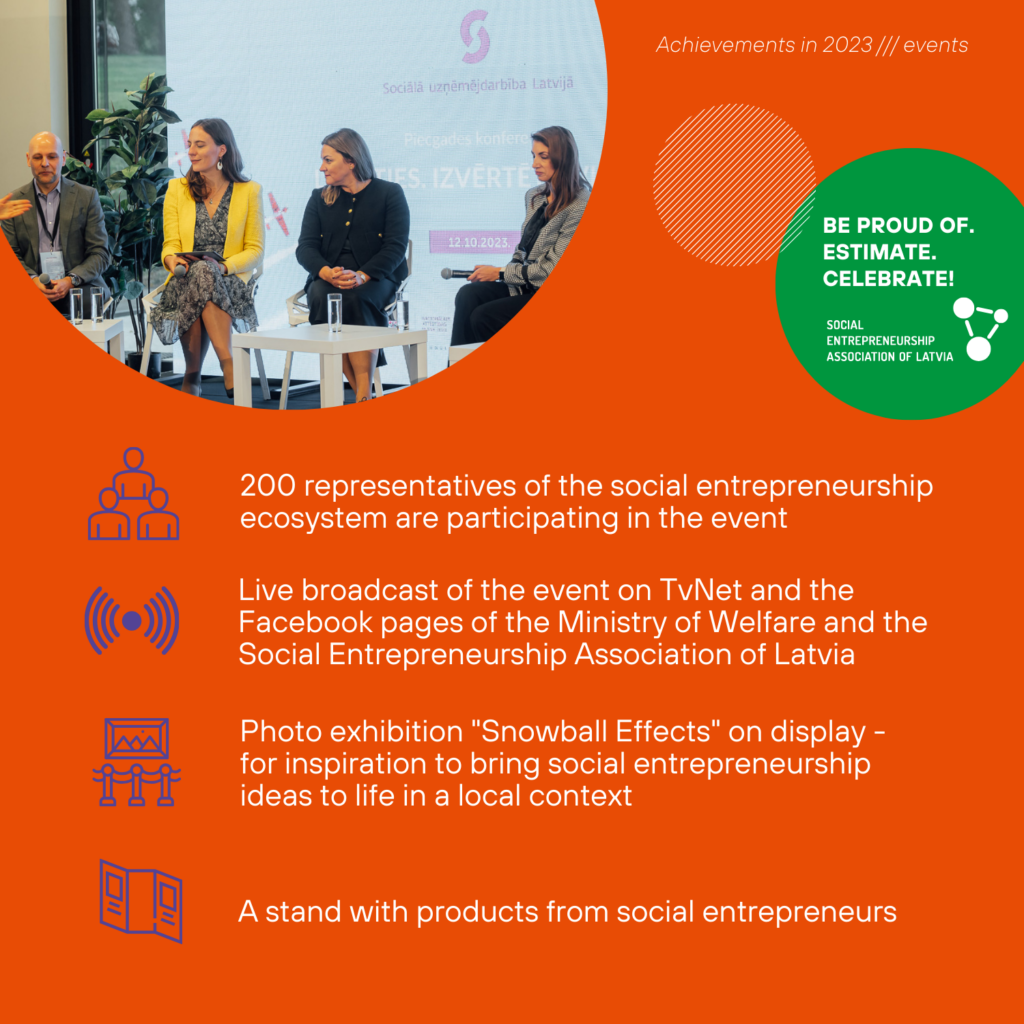
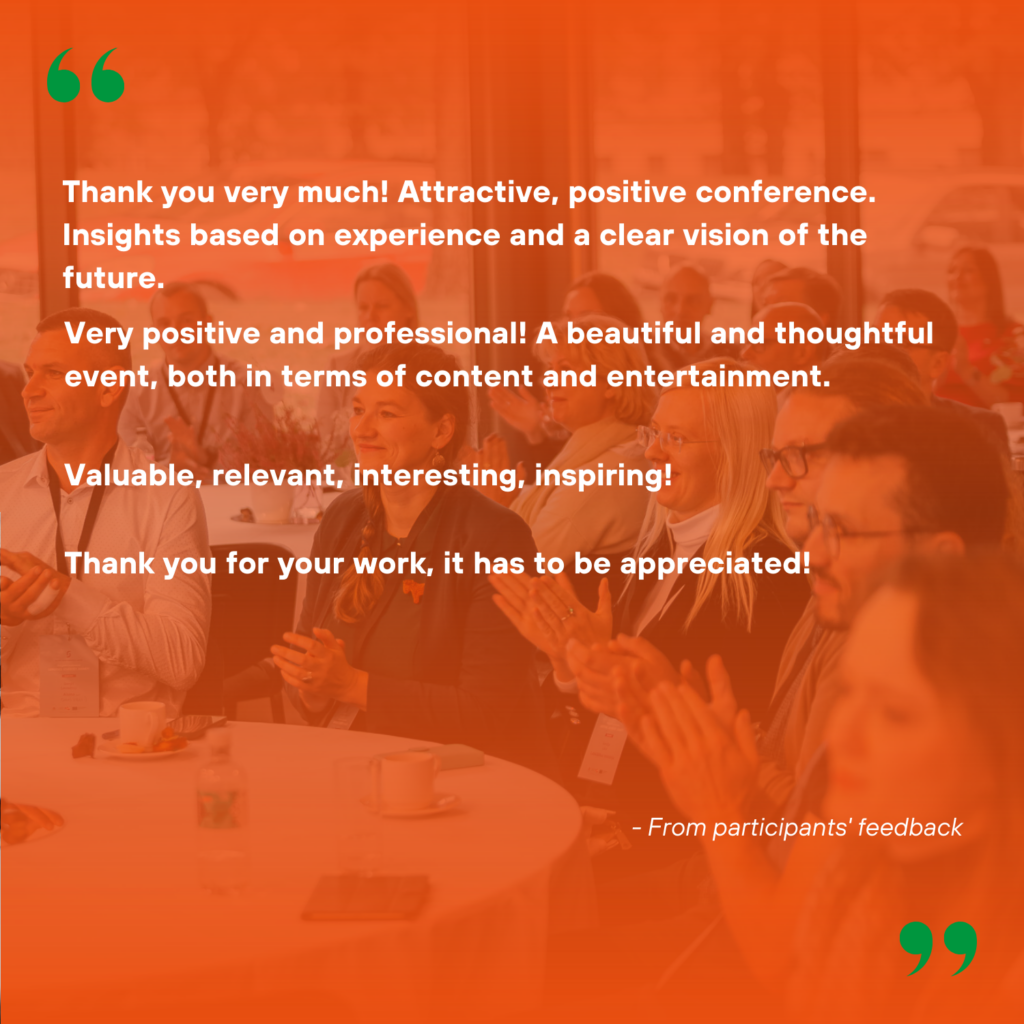
***
“Constellation of Social Entrepreneurs” Stage at the Conversation Festival “LAMPA”
For the first time ever, the Conversation Festival “LAMPA” dedicated its own stage to social entrepreneurship – “The Constellation of Social Entrepreneurs”, which offered a diverse and exciting programme with more than 10 events in various interesting formats throughout the festival! They inspired, informed and provided practical knowledge not only about the daily life of social entrepreneurs, but also focused on 3 main themes – social entrepreneurship, inclusive society and innovation in education.
The two-day stage was organised together with our members, the social enterprise “Constellation Team”, who provided the Constellation Cube – a creative platform/stage where you could try playing musical instruments, sing and do creative tasks in between the events.
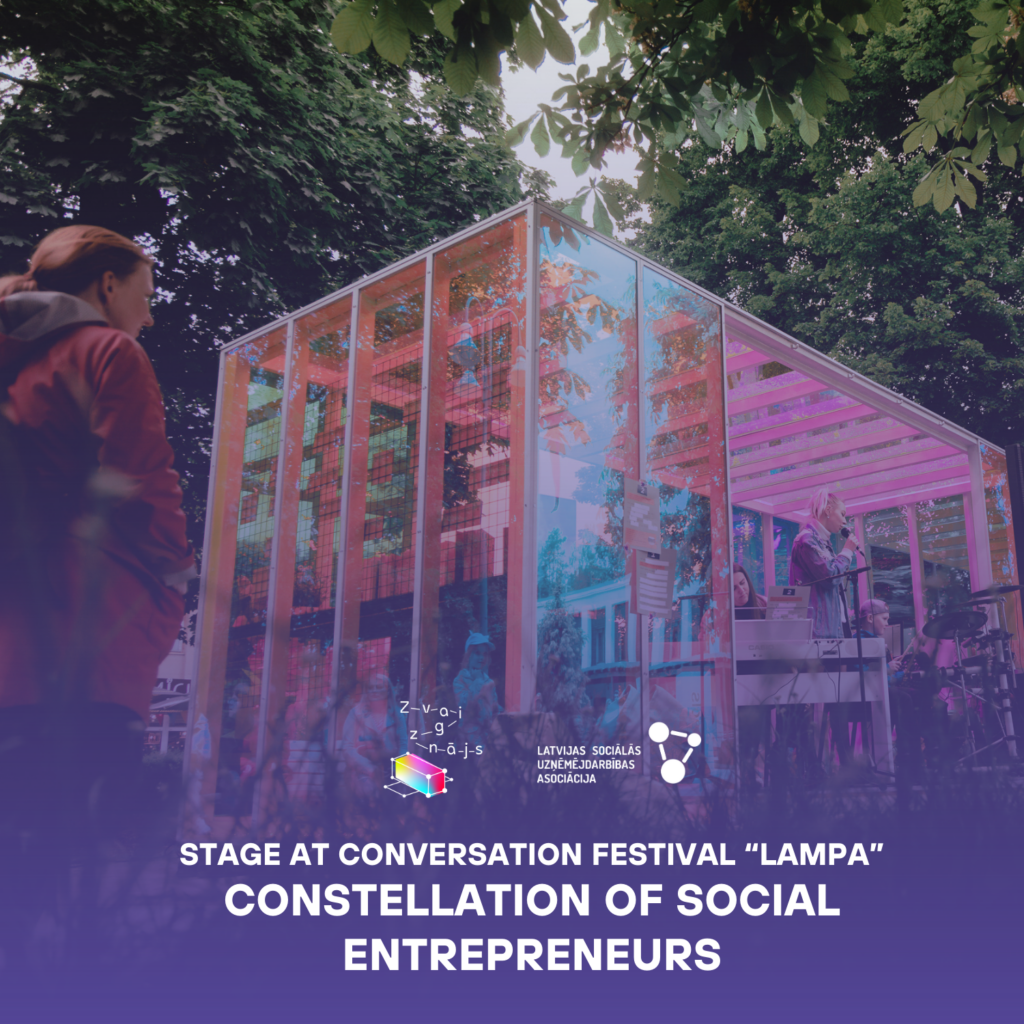

We organised 10 events with social entrepreneurs:
- Ltd “Kano Editions” masterclass “Learning through play and creativity”;
- Social enterprise “Liberated” and the “Mobility Centre for People with Disabilities” organised a discussion on an inclusive society “Invisible abilities – how to include otherness?”;
- Discussion by the social enterprise “Barboleta” on “Motivation and innovation in education”;
- “Mentor Latvia” discussion “YES! Young people start an independent life! How?”;
- The Social Entrepreneurship Association of Latvia organized charades “Don’t build empty straws!”, which allowed to get to know social enterprises in an interactive way;
- Social enterprise “Rabarbers” organized “Whining room – support group for parents”;
- Riga Business School created discussion “When Latvia innovates education, we get to Harvard, Buffalo and MIT!”;
- Discussion of the social enterprise “Mammamuntetiem.lv” “Who is smarter in family matters – mum or dad?”;
- A talk by the social enterprise “Ligero” on activating the invisible workforce “Job opportunities for all!”;
- Interactive discussion “Invisible World: close your eyes and see – education through entertainment in the dark” by the social enterprise “Invisible World”.
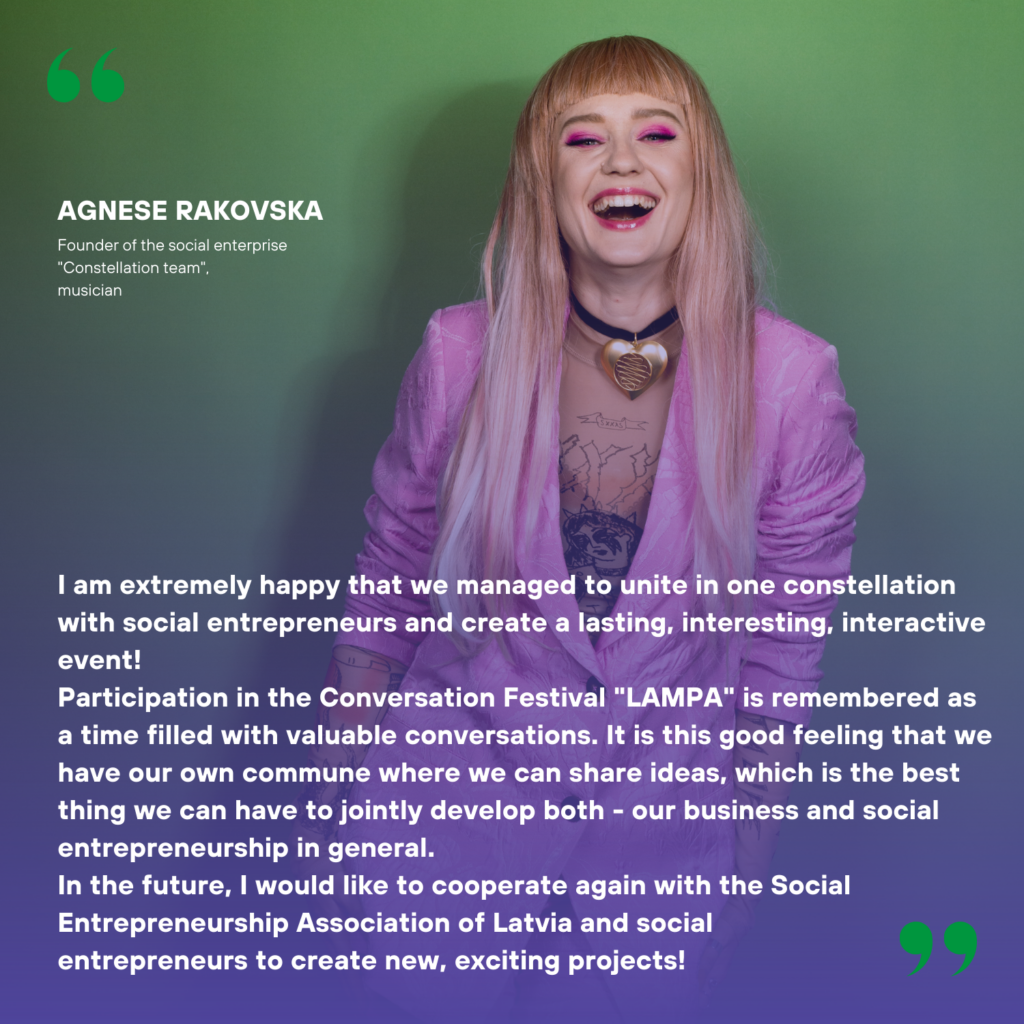
————–
Cycle of Social Entrepreneurship Acitivities
“DEVELOPING SOCIAL ENTREPRENEURSHIP TOGETHER!”
The most significant advocacy events in 2023 took place during the Ministry of Welfare’s Social Entrepreneurship Activity Cycle “Developing Social Entrepreneurship Together!” funded by the European Social Fund. Strengthening the social entrepreneurship ecosystem in Latvia took place from the beginning of the year until November. The activities were implemented by organisations representing the sector – the Social Entrepreneurship Association of Latvia, the association “New Door”, “Reach for Change Latvia” and the social enterprise “Visas Iespējas” (All Opportunities). The series of events was aimed at different target audiences – existing and prospective social entrepreneurs, stakeholders in the sector, local authorities, investors and policy makers, young people, business incubators and organisations with the capacity and resources to create an enabling environment for social entrepreneurship.
***
VISITS TO ALL MUNICIPALITIES
Between December 2022 and May 2023, the Social Entrepreneurship Association of Latvia met with all 43 Latvian municipalities in individual face-to-face visits to discuss their opportunities to engage in social entrepreneurship development, tools and actions to support the sector, as well as examples of good practice. A total of 317 municipal staff, including chairpersons and executive directors, participated in the face-to-face meetings. Overall, after these visits, SEAL has concluded that organizing meetings and discussions on social entrepreneurship in municipalities is a very important step for the development of the sector. The development of the sector requires the involvement of a wide range of professionals, and by meeting representatives from different sectors, even within the same municipality, discussions and the planning of new interdisciplinary activities were stimulated. It is important to continue working with municipalities, both to follow developments in the field in each region and to maintain up-to-date information exchange due to the turnover of municipal staff.
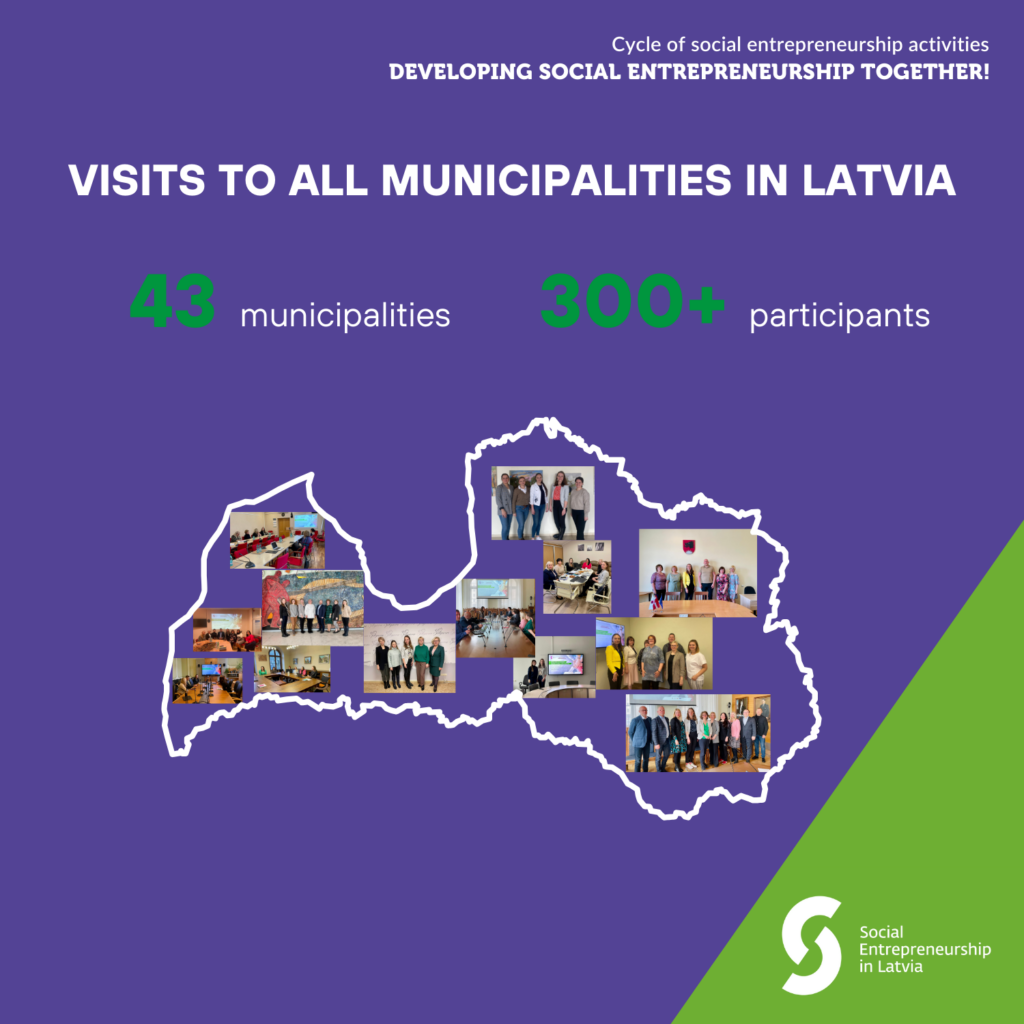
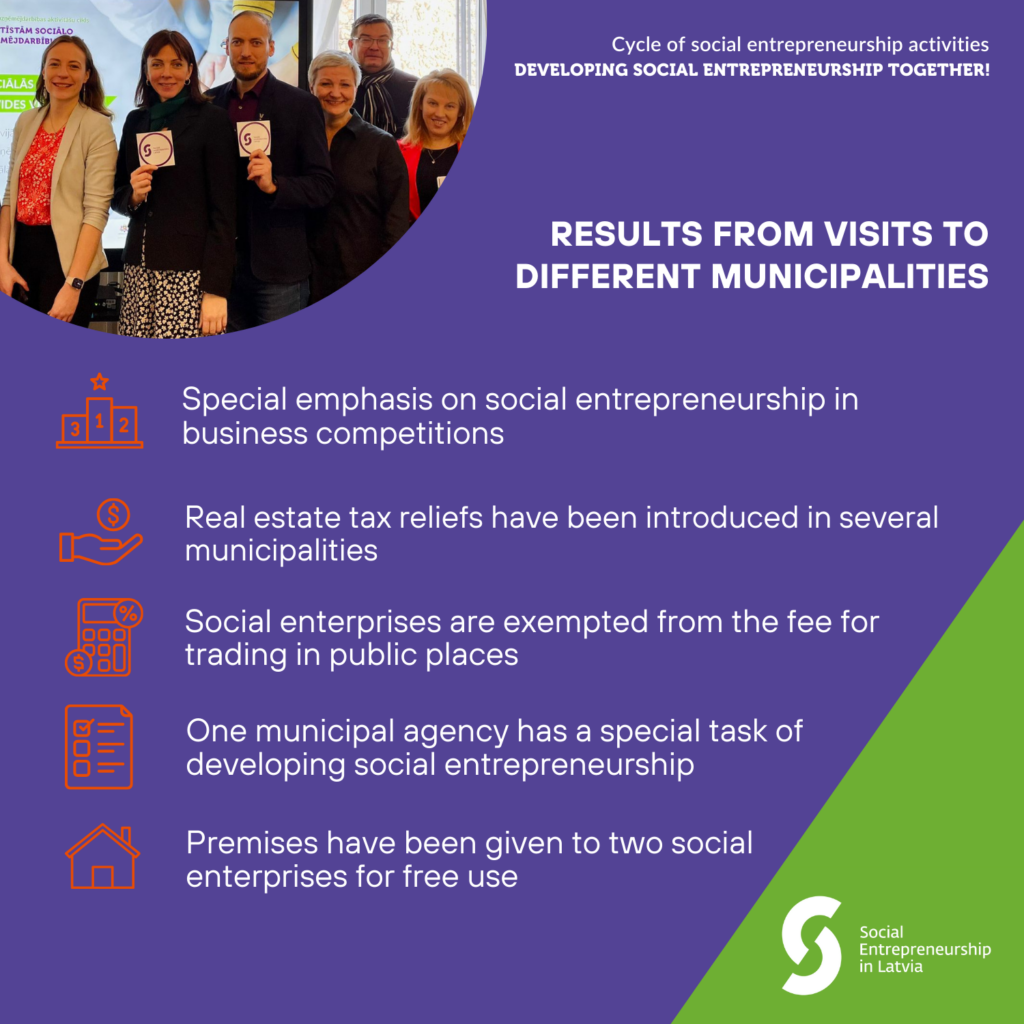 We have noted that after visits to at least four municipalities, business support competitions have focused specifically on social entrepreneurship, at least four other municipalities have introduced real estate tax exempts for businesses with social enterprise status, at least two municipalities have introduced sales tax exempt, a municipal agency has been tasked with developing social entrepreneurship, and two municipalities have given free use of premises to social enterprises.
We have noted that after visits to at least four municipalities, business support competitions have focused specifically on social entrepreneurship, at least four other municipalities have introduced real estate tax exempts for businesses with social enterprise status, at least two municipalities have introduced sales tax exempt, a municipal agency has been tasked with developing social entrepreneurship, and two municipalities have given free use of premises to social enterprises.

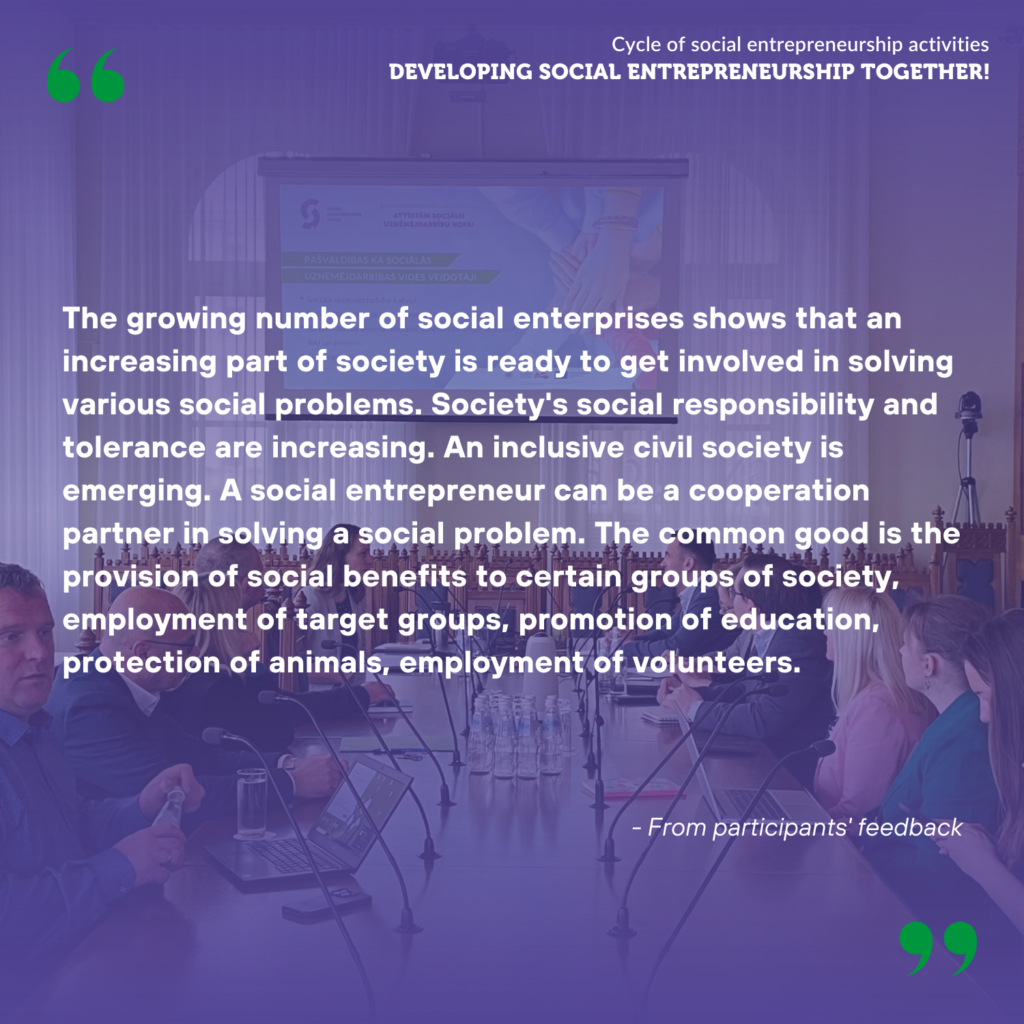
***
SOCIAL ENTREPRENEURSHIP SCHOOL
To provide comprehensive knowledge for starting and running a successful social entrepreneurship, we organised a free e-learning course “Social Entrepreneurship School”. It was attended by people interested in social entrepreneurship, as well as by idea authors and existing social entrepreneurs.
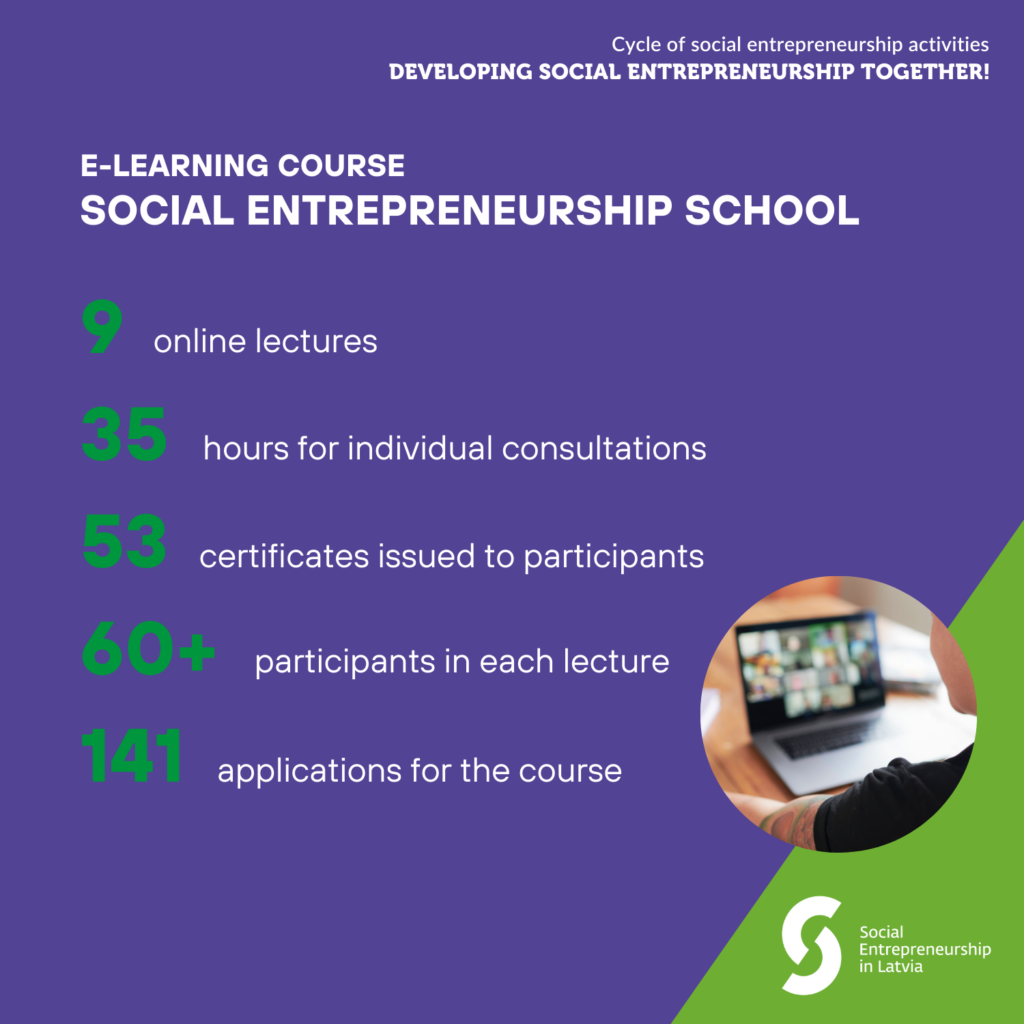
In a series of nine online lectures, experts from different fields provided concise and useful knowledge on topics relevant to social entrepreneurship, such as
- The basics of social entrepreneurship;
- Business plan development and reviewing existing plans;
- Creating and identifying social impact;
- Financial management;
- Branding and selling the company;
- External and visual communication;
- Digital marketing;
- Business crisis management;
- Creativity.
***
REGIONAL THINK-TANKS
The social entrepreneurship ecosystem comprises a variety of stakeholders who together create a strong and supportive environment for the development of social enterprises. Strengthening this ecosystem is important as it fosters sustainable and socially impactful entrepreneurship that generates positive impacts for both society and the environment. In order to promote understanding and involvement of all stakeholders in strengthening the social entrepreneurship ecosystem, we bring together in regional Think-tanks opinion leaders, entrepreneurs, representatives of different organisations and municipalities with the will, opportunity and resources to strengthen and develop social entrepreneurship in the region, as well as social entrepreneurs themselves. The aim of the Think-tanks is to understand the role of each stakeholder and to prepare concrete action plans (actions here and now, not visions of the future) to strengthen and develop social entrepreneurship in each region.
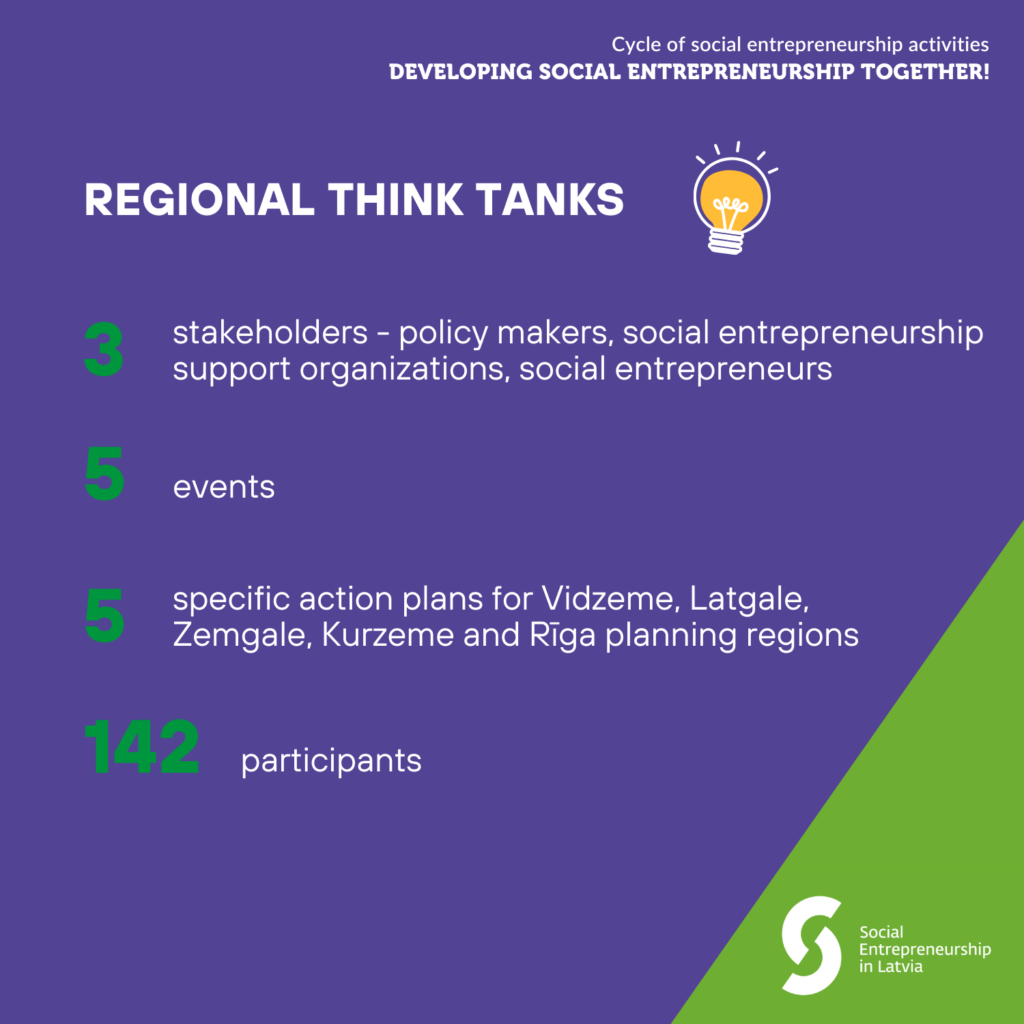
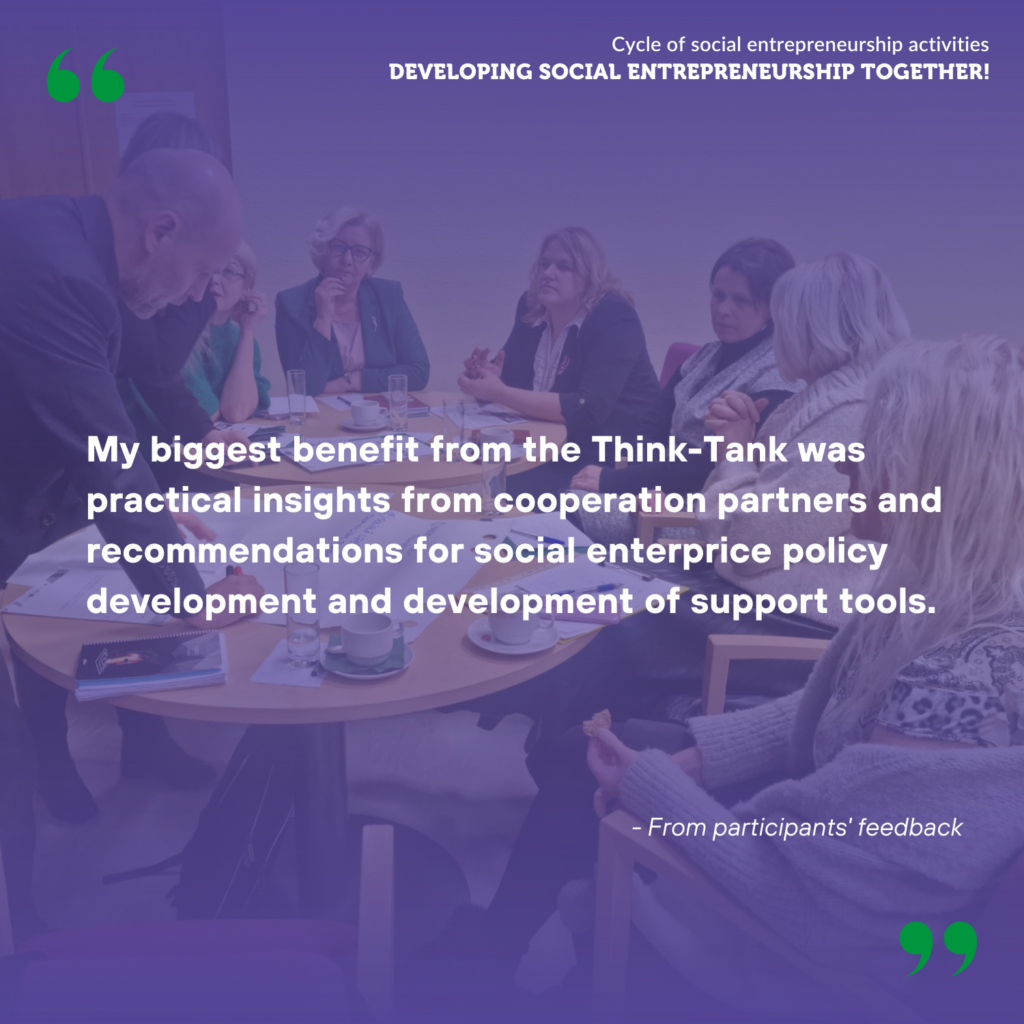
***
8 MEETINGS WITH INTERESTED ORGANIZATIONS
In the regions, we held meetings with organisations that have the potential to develop social entrepreneurship ideas or are already developing the field, such as academic staff. In this way, we strengthened the knowledge and capacity of existing organisations and informed new audiences about social entrepreneurship, both by inspiring young people and by creating opportunities for entrepreneurs to learn more about social entrepreneurship. A total of 8 events took place in six cities.
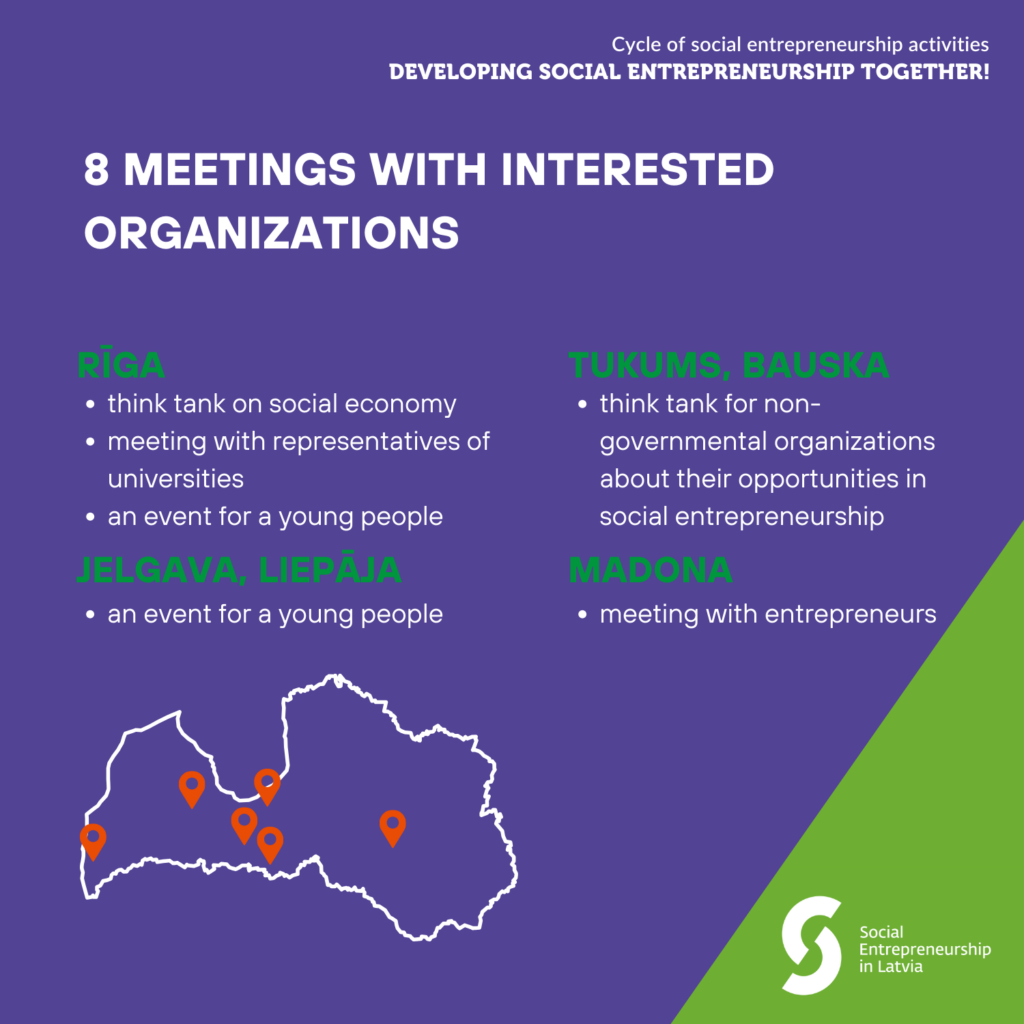
***
REGIONAL EVENTS ABOUT SOCIALLY RESPONSIBLE PUBLIC PROCUREMENT
Together with the Procurement Monitoring Bureau Office and the Centre for Public Policy PROVIDUS, we organised five workshops on “SOCIALLY RESPONSIBLE PUBLIC PROCUREMENT – benefits, risks, examples, practices” in February and March 2023, attended by a total of 123 participants, who were also offered individual consultations.

The events explained the nature and benefits of socially responsible public procurement for public authorities, the practical and legal aspects of implementation and enforcement, examples of good practice, risks and practical work.
An explanatory guide to socially responsible public procurement was also produced, providing clear and concise information on the stages of procurement implementation, recommendations to be taken into account when setting requirements in public procurement, conditions and examples for different groups of services and goods, as well as for the implementation of public works, as well as examples of good practice from Latvia.
***
NETWORKING EVENTS FOR SOCIAL ENTREPRENEURS
This summer we invited social entrepreneurs, social entrepreneurship idea authors, representatives of municipalities and sector support organisations, as well as other interested parties to networking and experience sharing events – visit social enterprises in the regions! It was an opportunity not only to get to know the work and daily life of social entrepreneurs in a practical way, but also to get to know each other, talk, gain inspiration and new knowledge, share experience, build new partnerships and strengthen the sense of belonging to the social entrepreneurship community! Not only the programme of events was inspiring, but also the venues – BMX track, horse pasture, Valmiera Green School, brunch farm, creative bread lab and other interesting places where we met and were inspired together with 89 participants.


***
REGIONAL EVENTS FOR WIDER PUBLIC
Our Social Entrepreneurship Ambassadors attended the events and social entrepreneurs shared their stories. To promote social entrepreneurship in different regions, each event featured a local social entrepreneur as well as a speaker from another region. Visitors had the opportunity to have a frank discussion with the social entrepreneurs, revealing their personal sides and insights into business.
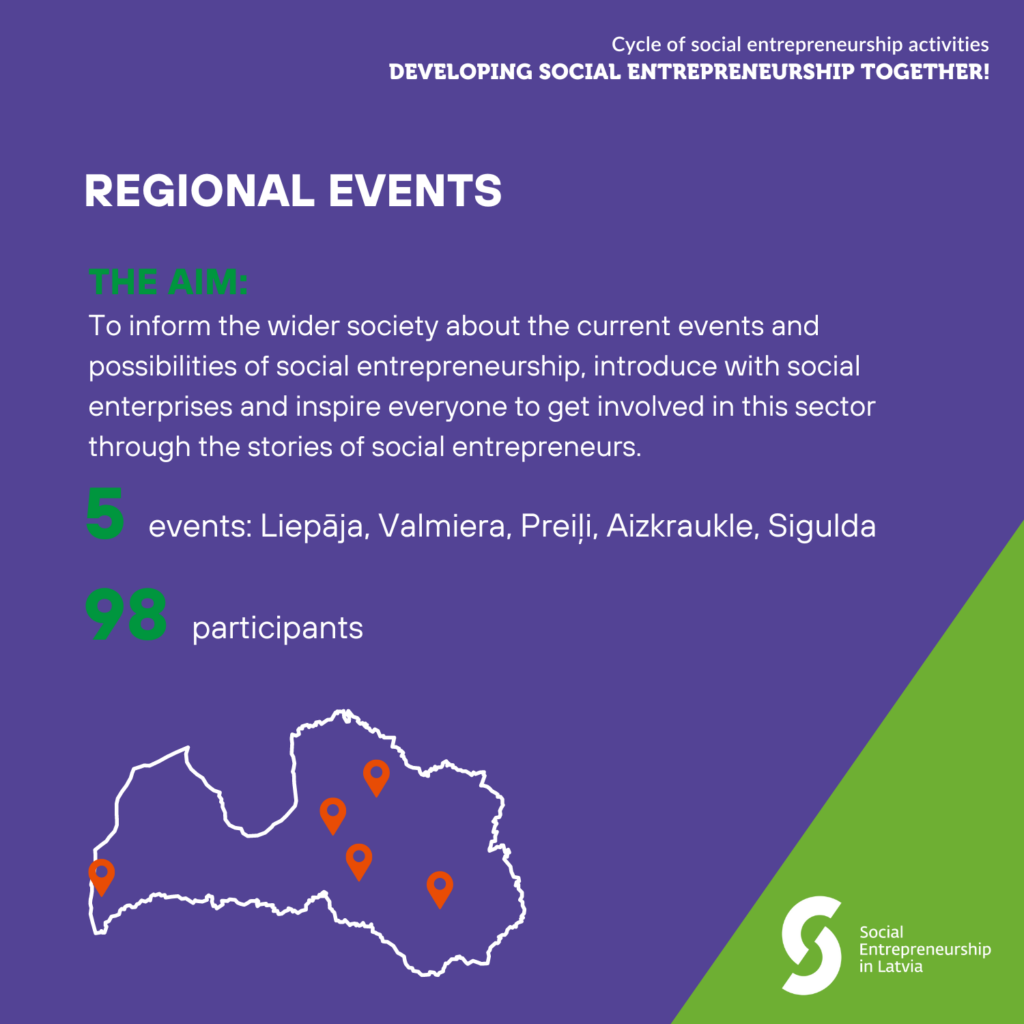

***
SYNERGY BETWEEN SOCIAL ENTREPRENEURSHIP AND OTHER AREAS
In order to promote the inclusion of the social economy in other planning documents and activities, proposals for the integration of social entrepreneurship/social economy aspects in other planning documents and activities were made, five proposals were submitted to the Ministry of Welfare.

The topics of proposals are:
- Proposal for the implementation of the deinstitutionalisation process in cooperation with social enterprises
- Proposal for the integration of social entrepreneurship aspects into the waste management process
- Proposal for integrating social entrepreneurship aspects into resocialisation
- Proposal for the inclusion of social entrepreneurship in the Diaspora Action Plan
- Proposal for the development of a social economy strategy in Latvia
The result has been useful materials that have been used in the work with stakeholders and have facilitated cooperation with organisations and companies working in these fields.
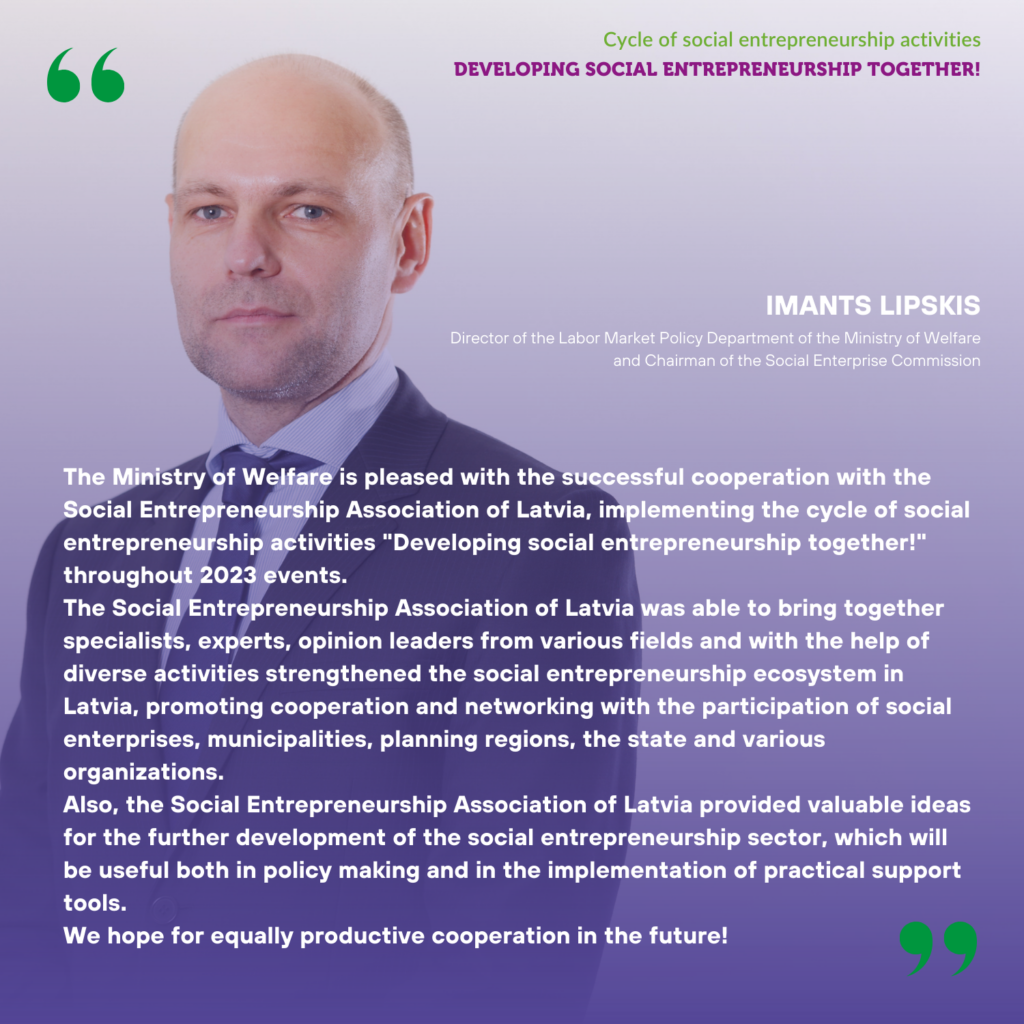
————–
SEAL MEMBER COMMUNITY
The Social Entrepreneurship Association of Latvia has 143 members, most of whom are social enterprises, but we also have social entrepreneurs and other interested parties – associations, foundations, LTDs without social enterprise status and individuals. During 2023, 14 members joined the community.
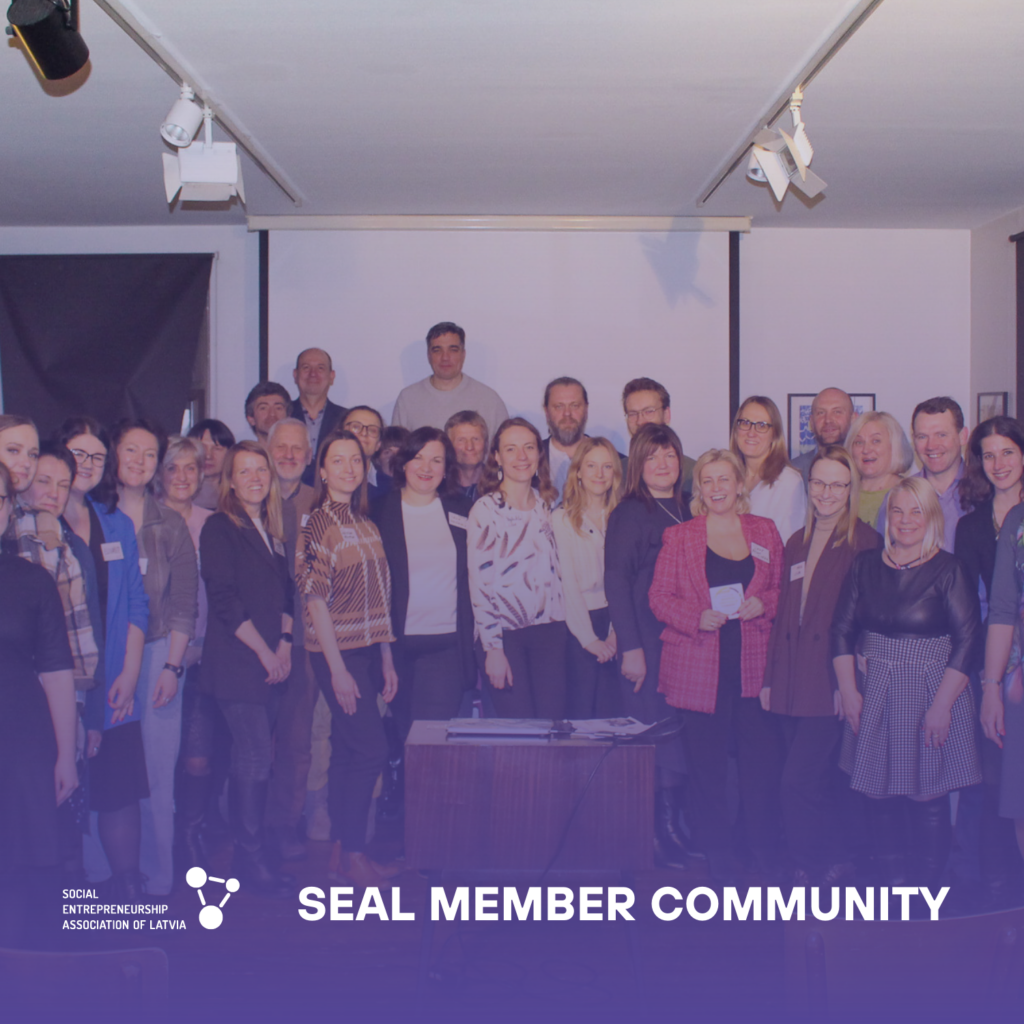
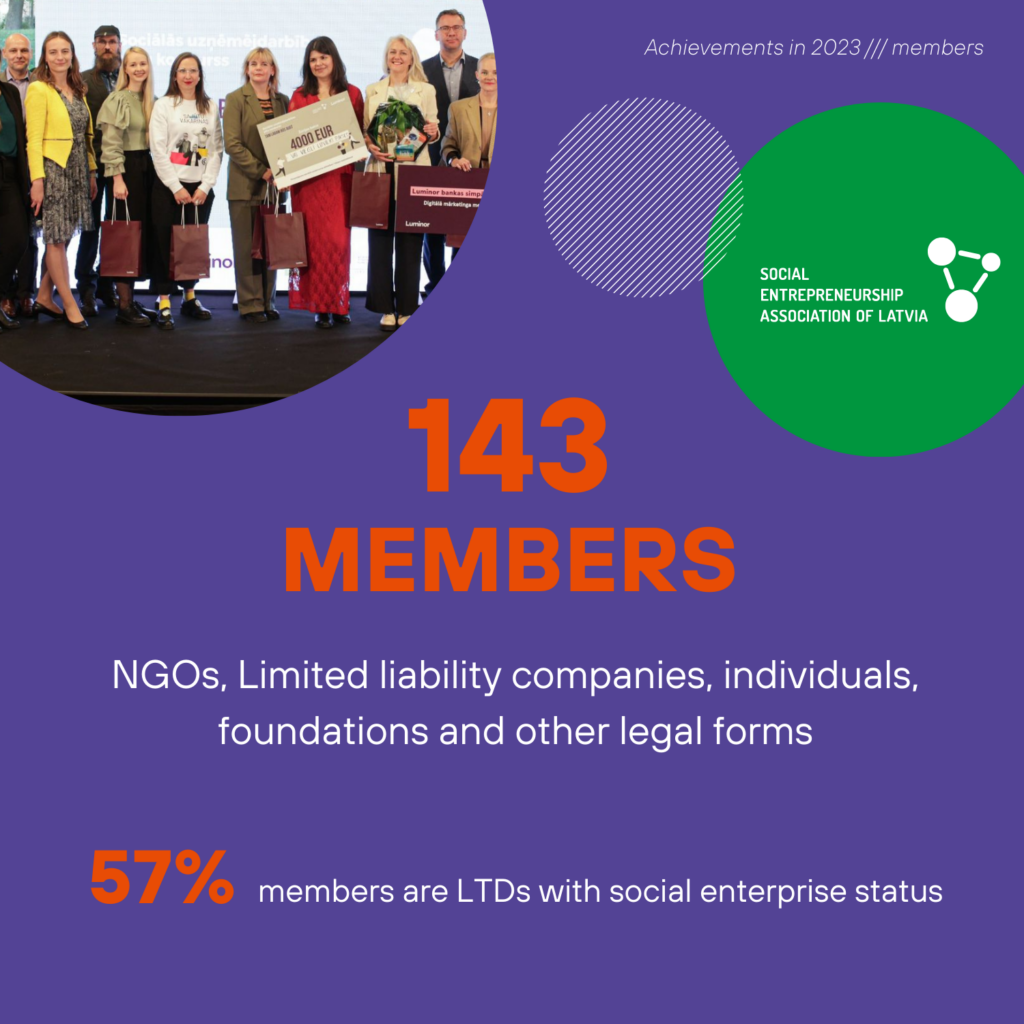
Becoming a member of the Social Entrepreneurship Association of Latvia gives everyone the opportunity not only to be part of an organisation that defends the interests of social entrepreneurs. It is an opportunity to find like-minded people, build new collaborations, stay informed about the most important developments in the sector, as well as to initiate new projects or thematic working groups.
This year we would like to highlight:
- We regularly gather key information on various training, competition and funding opportunities. During 2023, we gathered 67 different offers;
- We organised 11 networking events – some of them were more focused on work integration implementors, but all of them were open for all members with thematic focuses: work life balance, export development, 2 trainings on Meta (Facebook and Instagram) platforms, as well as visits to social entrepreneurs;
- Five of the members have been nominated for different competitions: the Top 100 Women in Social Entrepreneurship to Agnese Frīdenberga, the Social Economy Award to Gustavs Upmanis from the social enterprise “Visas Iespējas” and Baiba Blomniece-Jurāne from the social enterprise “Barboleta”, the social enterprise “Mobilizing” with the Difftravel initiative, and the social enterprise “Neredzamā pasaule” in the “Disability Award of the Year” organised by the Ombudsman, 3 of which have also won these nominations!
- During the year, we sent out 18 mailings inviting people to get involved in various SEAL activities, participate in events and competitions organised by others, and apply for funding or development opportunities;
- We created 16 new podcast episodes with social entrepreneurs;
- We provided publicity opportunities for members at the Conversation Festival “LAMPA”, and raised the profile of the sector by creating a 2-day stage programme “Constellation of Social Entrepreneurs”.
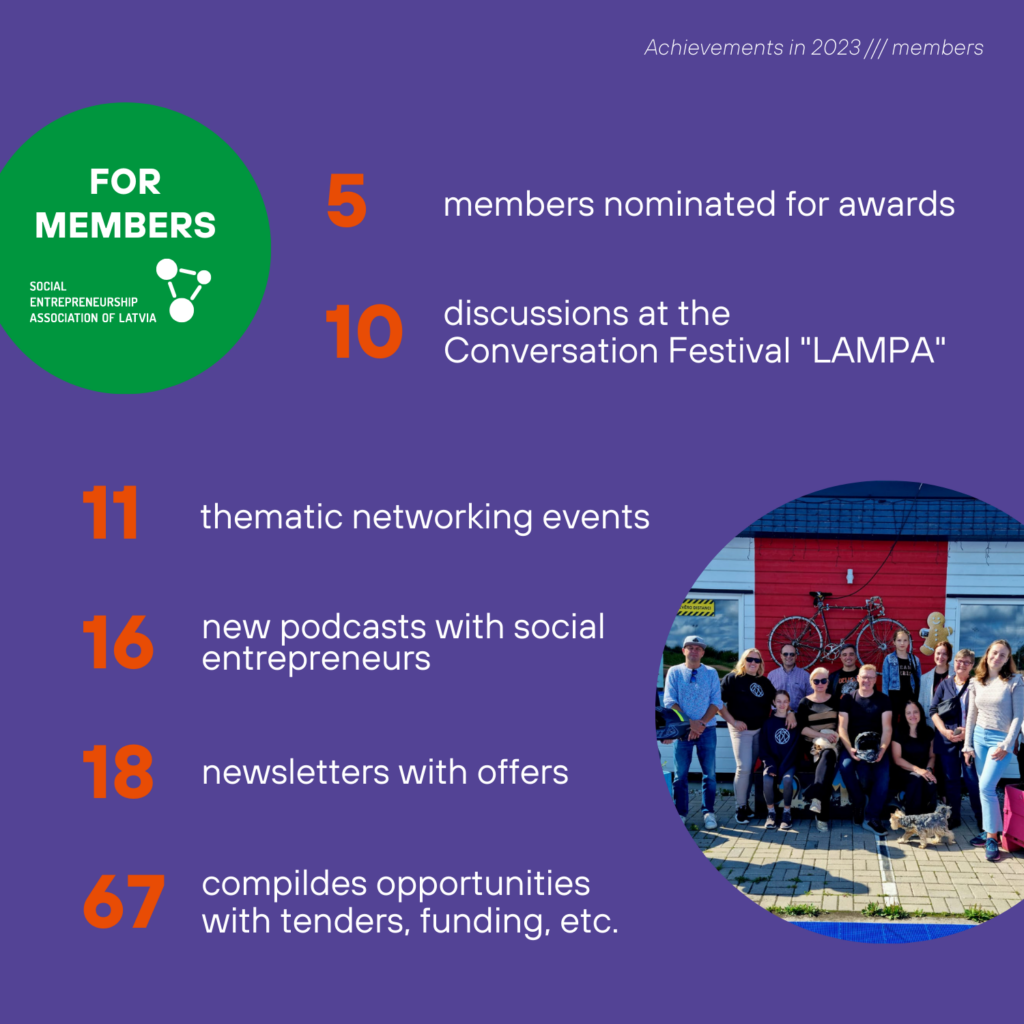
- We made it possible to join our joint health insurance scheme – a much-appreciated annual initiative among our members who would otherwise not be able to get a health insurance policy.
- Each year we make our members’ offers available at various festivals so that everyone can buy the goods and services produced by our entrepreneurs. For summer and Christmas offers we provide special publicity with paid advertising;
- We offer our members to participate in various international projects and initiatives – in 2023 we organised 2 trainings on podcast as a tool for social impact communication in Tallinn and Riga, we created an exchange visit to Lūznava Manor on the development of the New European Bauhaus Initiative, and we went on exchange visits together to Sicily and Croatia;
- In addition, we provide free invitations or discounts to various events such as the Sustainability Conference and others.


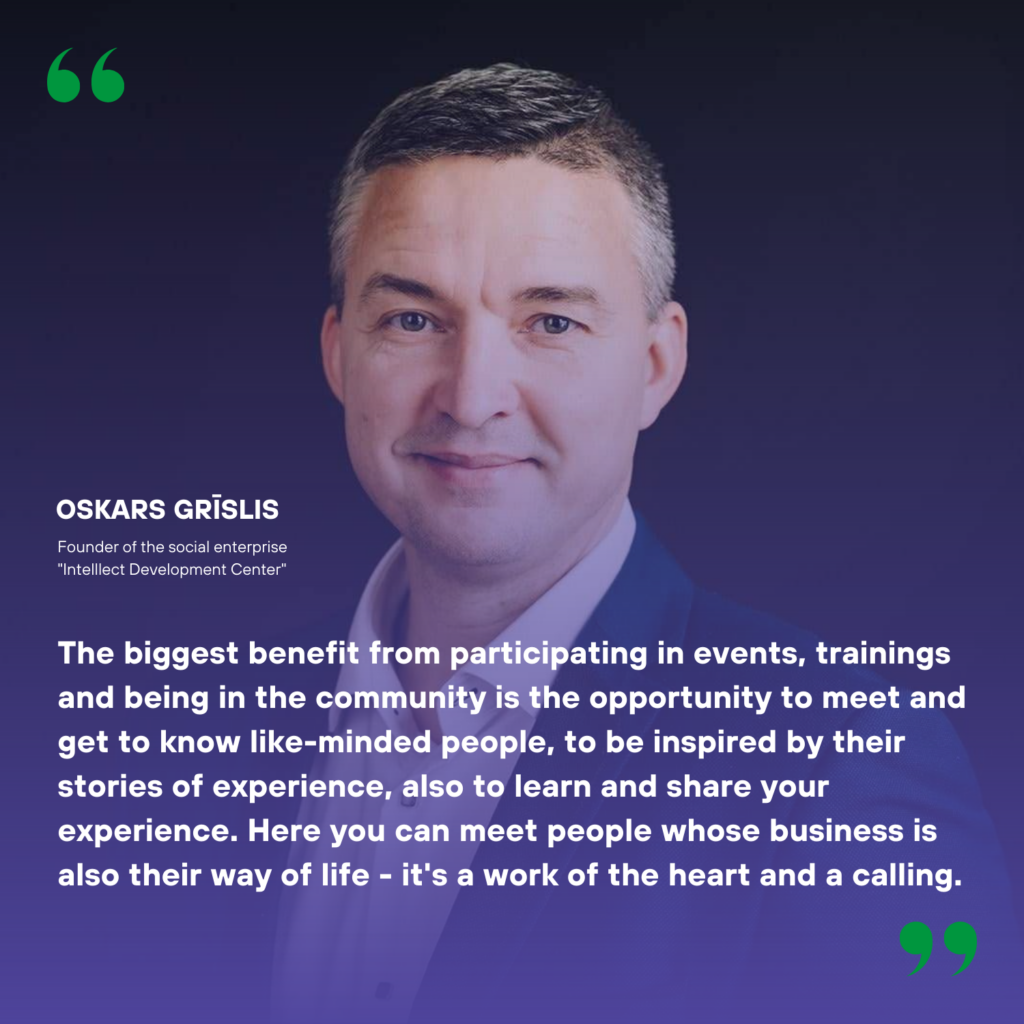
————–
ADVOCACY AT THE NATIONAL LEVEL
The Social Entrepreneurship Association of Latvia works in advocacy both nationally and internationally. Local priorities include creating a supportive environment for the development of social enterprises, establishing and developing meaningful support mechanisms for social entrepreneurship, and adopting regulations binding on social entrepreneurs.
International priorities include participation in projects and activities organised by international social entrepreneurship network organisations.
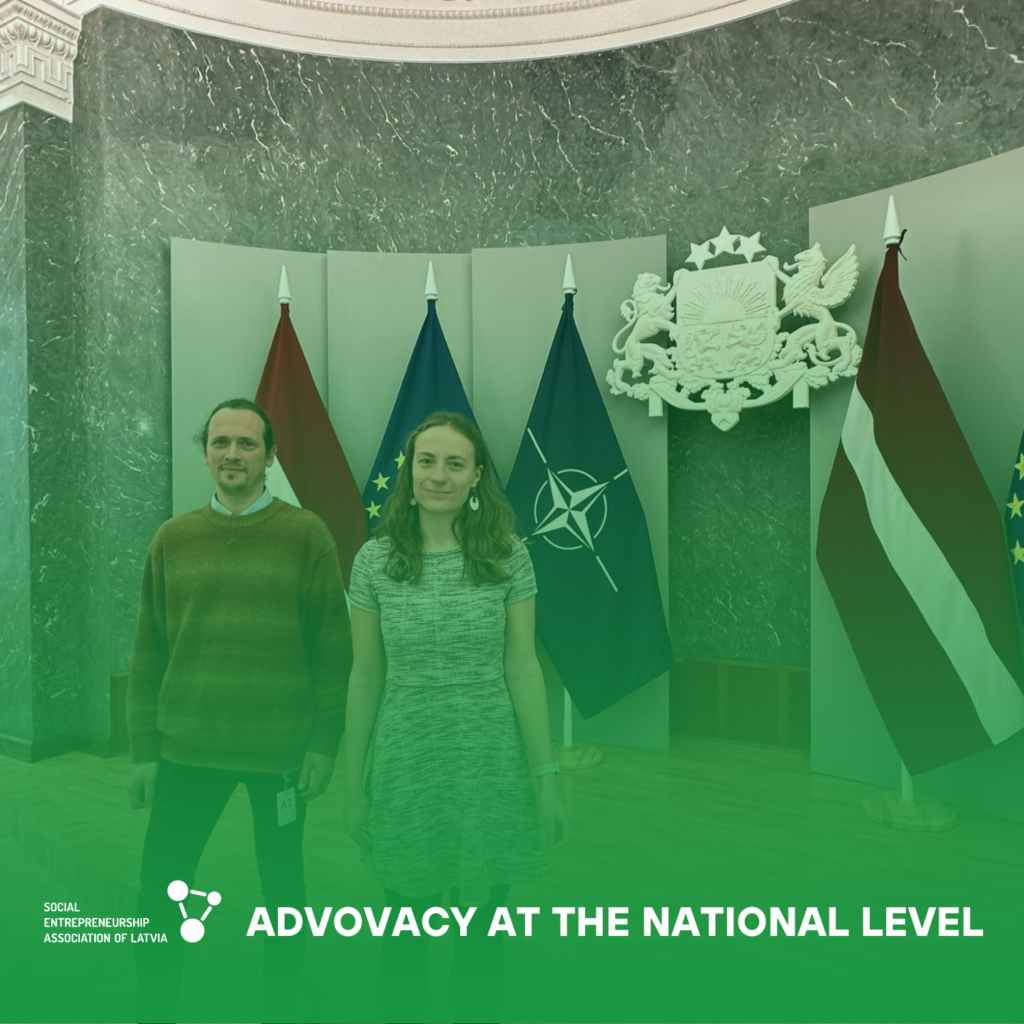
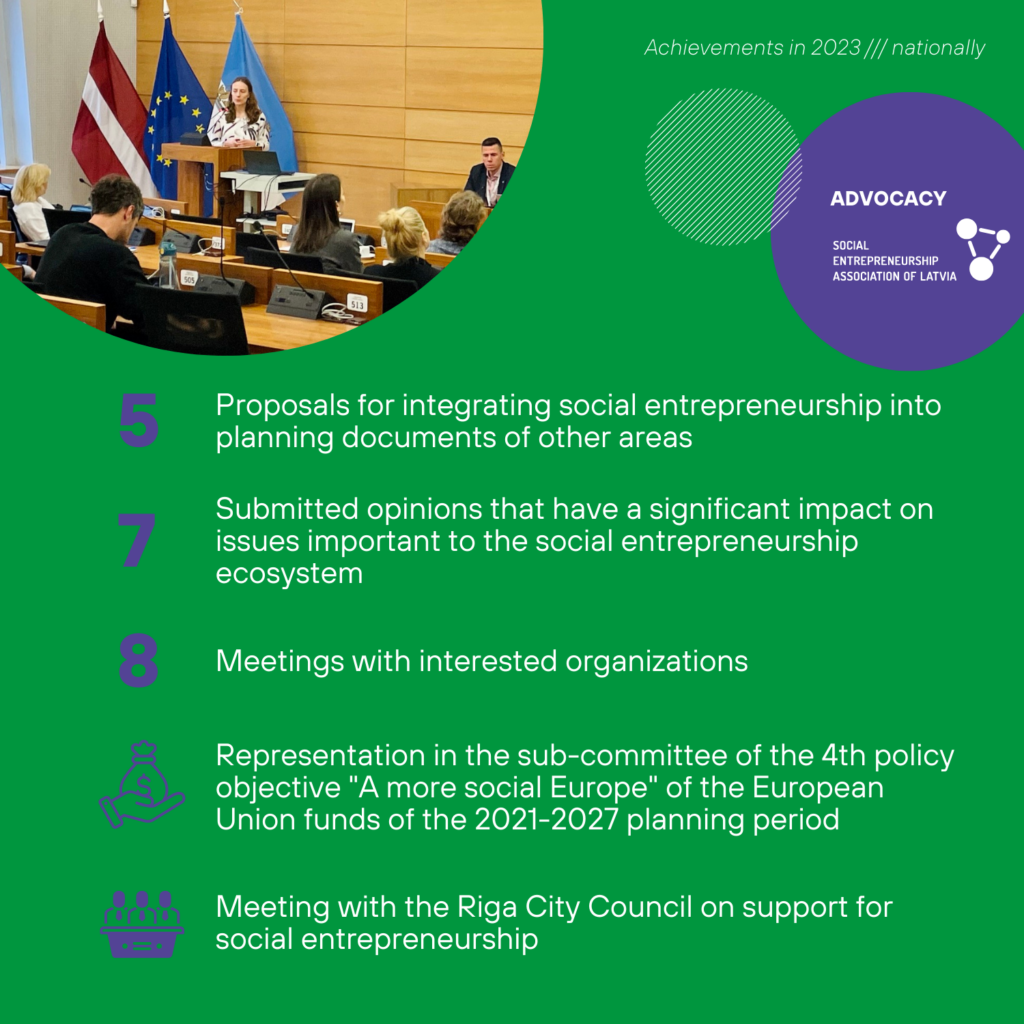
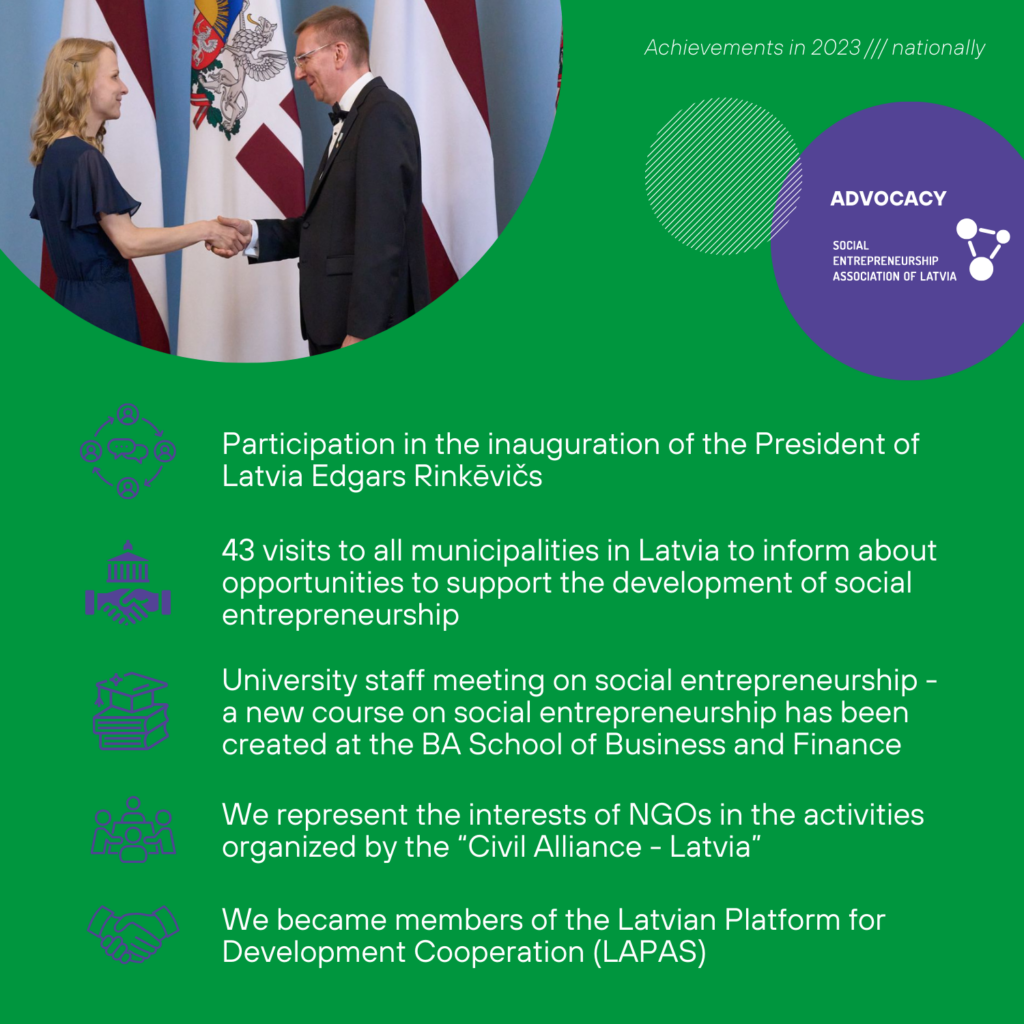
In 2023, a special focus will be on advocacy and the development of the social entrepreneurship ecosystem. Among the achievements, we highlight:
- We have developed 5 proposals to integrate social entrepreneurship into other areas;
- We issued 7 opinions that have a major impact on issues relevant to the social entrepreneurship ecosystem:
- Amendments to the Law on Public Benefit Organisations;
- Conceptual report on “Opportunities to stimulate investment and diversify financing in social enterprises to promote their long-term growth”.
- Rules for the implementation of Measure 4.3.3 “Support to Social Entrepreneurship” Amendments to the Public Procurement Law
- Rules on the social target groups of pupils of a private educational establishment and the conclusion of an agreement on the participation of the municipality in the financing of the maintenance costs of the establishment Latvia’s position on the Social Economy Action Plan
- On the establishment of a competence centre for social innovation
- In 2023, we started working on the EU Fund Monitors project, where we are involved in sub-committees for monitoring EU funds, together with 5 other organisations. The nomination of Regita Zeila, Director of the Latvian Social Entrepreneurship Association, was approved by the Memorandum Council, nominating her to represent the views of non-governmental organisations in the EU Funds Monitoring Sub-Committee “A More Social Europe”.
- On the initiative of the Deputy Mayor of Riga, Edvards Ratnieks, in November we participated in a meeting between the Riga City Council and social entrepreneurs, the aim of which was to inform social entrepreneurs about current developments in the field of business support in the Riga City Council. Around 20 social entrepreneurs from Riga took part in the discussion and actively expressed their suggestions for closer cooperation with the Riga City Council, including:
– the possibility of introducing real estate tax incentives for companies with social enterprise status,
– the availability of premises and a clear process for obtaining information and applying for them,
– a single point of contact. - We represent the interests of our members in other associations of which we are members – the Civic Alliance-Latvia, as well as in the organisation “Latvian Platform for Development Cooperation”;
- We met with academics who are developing courses and study programmes on social entrepreneurship, which resulted in a new course at the BA School of Business and Finance.
***
ASSOCIATION’S EXPERTISE
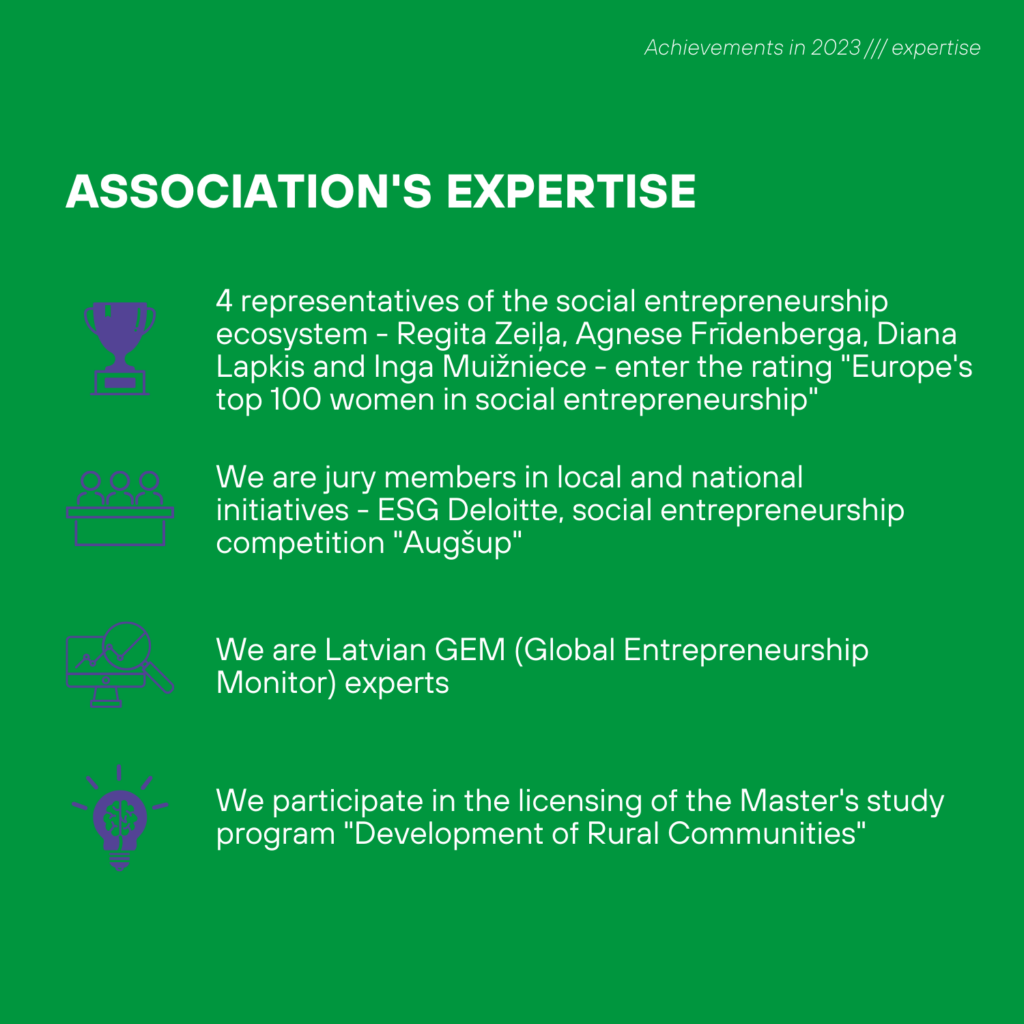
Active work in advocacy has led to various recognitions, new collaborations and work as an expert in the field of social entrepreneurship and the social economy.
Last year, the Director of the Social Entrepreneurship Association of Latvia was one of the 4 representatives from Latvia to be included in the “Top 100 Women in Social Entrepreneurship”. Agnese Frīdenberga, a senior researcher at the Providus Think-tank and a long-standing member of the SEAL Council, Diana Lapkis, founder of social entrepreneurship accelerator New Door, and Inga Muižniece, founder of social enterprise Sonido and Chairwoman of the SEAL Council, were also included in the top 100 from Latvia.
As experts, we were involved in evaluating competitions, licensing study programmes related to social entrepreneurship, and assessing entrepreneurship activity at national level.
————–
INTERNATIONAL COOPERATION
This year, the international dimension was also well represented, with various projects providing opportunities for our members to take part in exchanges and developing valuable materials for use in their daily work.
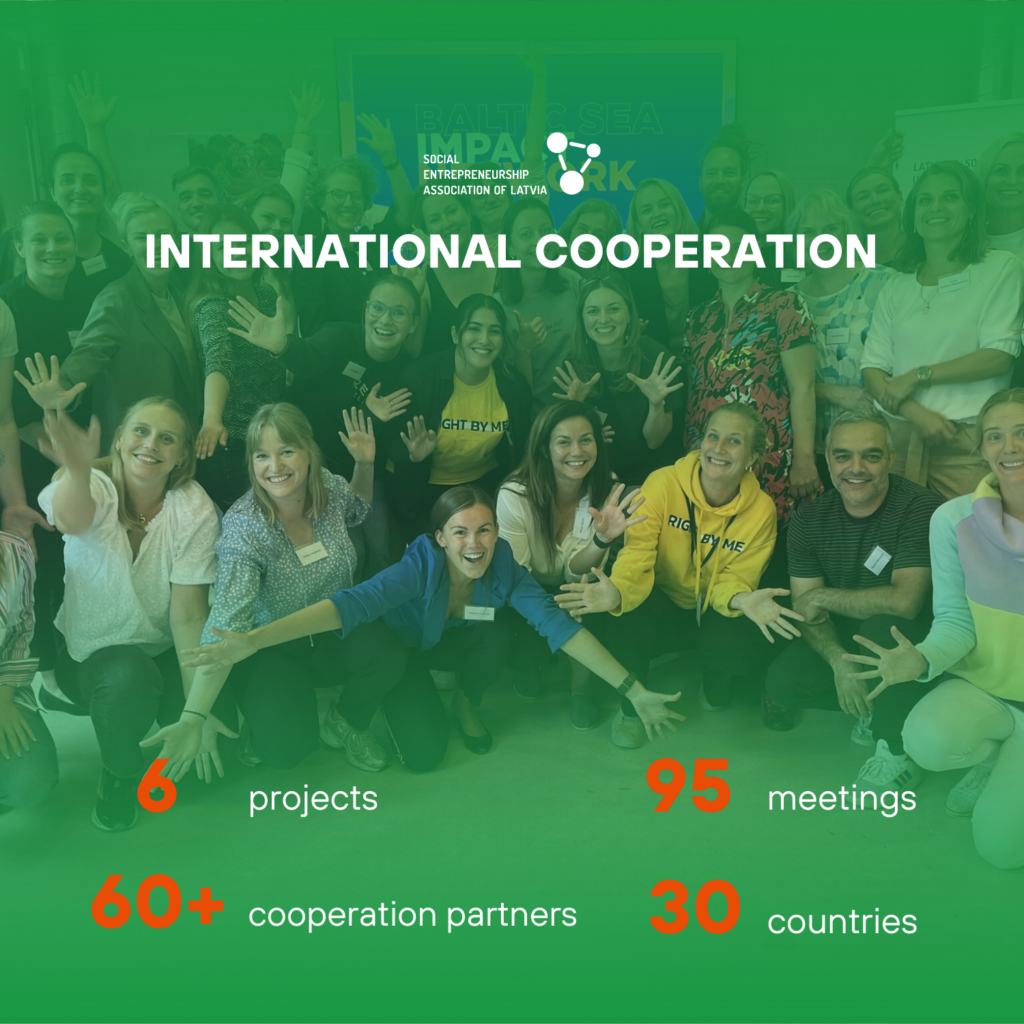
In 2023 we continued the work with 6 projects:
- We continued our work on the B-WISE project “Blueprint for Sectoral Cooperation on Skills in Work Integration Social Enterprises (B-WISE)” with 28 partners from 13 countries. The project aims to develop the skills of everyone working in a work integration social enterprise and to develop a Europe-wide strategy to tackle skills shortages in the work integration sector.
- In 2023, we started engaging social economy actors in the “New European Bauhaus” within the SEA4NEB project. The project aims to combine design, sustainability, accessibility, affordability and investment to help deliver the European Green Deal and connect with the everyday lives of European citizens. The involvement of social entrepreneurs is important as they also work on issues such as regeneration of abandoned spaces through an inclusive, green and local community development approach.
- The LOCAL-Y-MPACT project, which aimed to promote cooperation between local authorities, social entrepreneurs and NGOs, has reached its final stage. HERE you can see the results developed during the project.
- As part of the Podcasting based social impact learning environment project, we organised 2 international trainings on podcasting as a tool for social impact communication. In addition, we recorded conversations with social entrepreneurs about the impact they are having, in collaboration with existing podcasts and programmes. Listen to them in Latvian HERE.
To develop the collaboration between traditional and social entrepreneurs, we joined the Buy Social B2B Europe project. The long-term impact of the project is to develop the concept of social procurement, or buying from social enterprises that put people and planet first.
The biggest added value of member organisations is often the opportunity to meet other like-minded people to build collaborations. We also provide this opportunity internationally through the Baltic Sea Social Impact Network, so that new collaborations can be established between social entrepreneurs in Latvia, Estonia, Lithuania and Sweden.
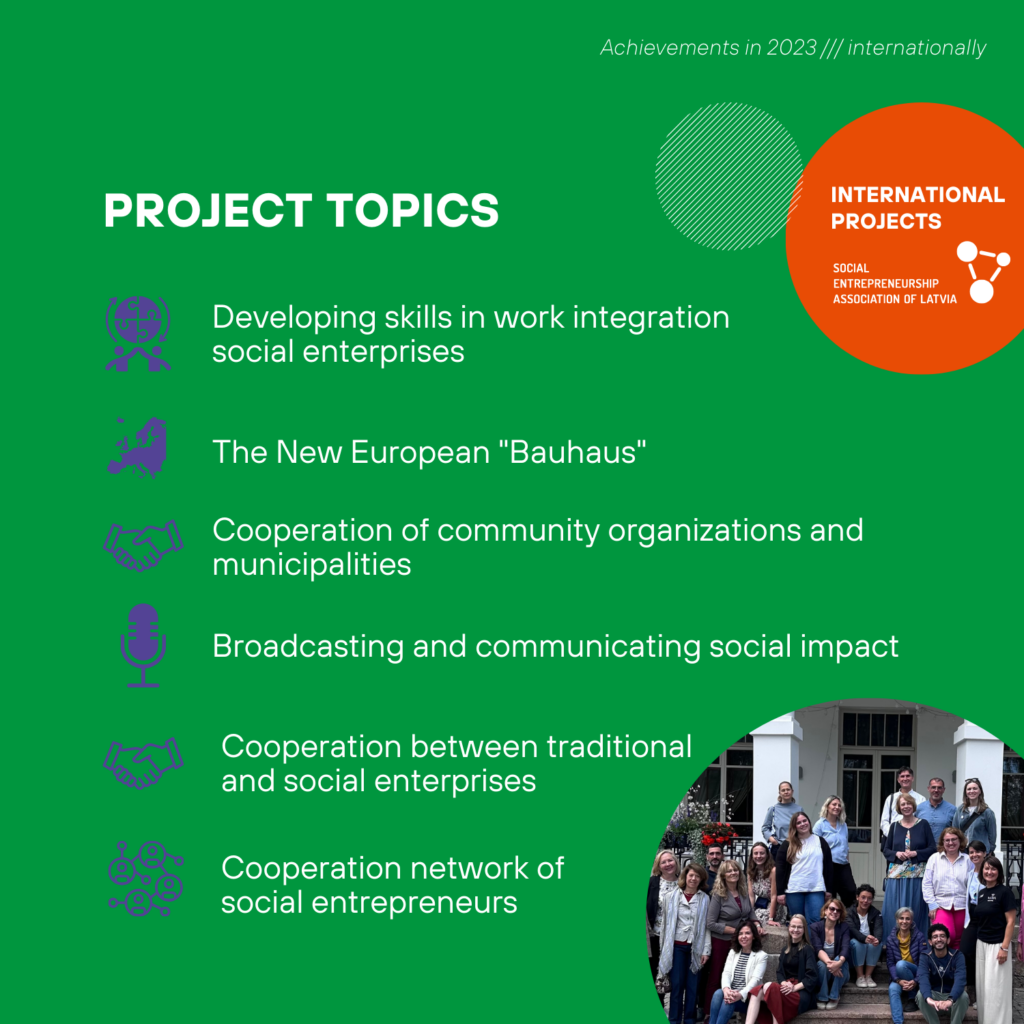

————–
INFORMING THE PUBLIC
For social entrepreneurship to thrive, awareness of the importance of the topic needs to be updated in society. That’s why we organise public lectures and workshops, get involved in events organised by other organisations, provide advice to those interested in social entrepreneurship and send out news bulletins on the latest developments.

In 2023, we have given 7 media interviews and sent out 10 newsletters with the latest opportunities for everyone. We provided 49 consultations to social entrepreneurs to help them understand the best way forward for their ideas. We participated in events organised by other organisations to talk about social entrepreneurship, such as the closing event of the Democracy Academy at the Mežaparks stage, the Democracy Festival in Kuldīga, the conference of the association “Cerību spārni” on social entrepreneurship as an employment opportunity for people with disabilities, etc.
In addition to the annual activities, we organised 5 regional think tanks to discuss the opportunities to get involved in social entrepreneurship, organised an e-learning course “School of Social Entrepreneurship” where 9 lectures were given on different aspects of social entrepreneurship, and collaborated with podcast producers to record episodes with social entrepreneurs to reach new audiences.
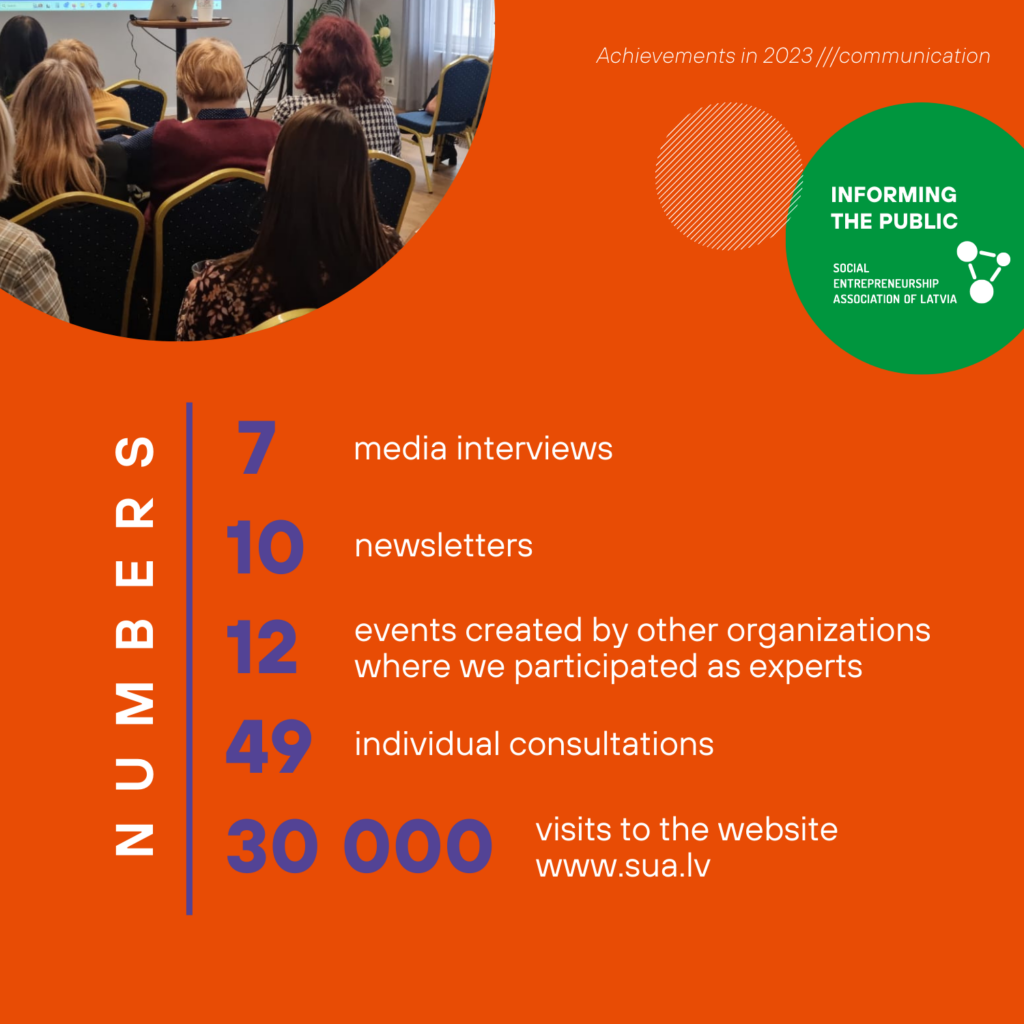
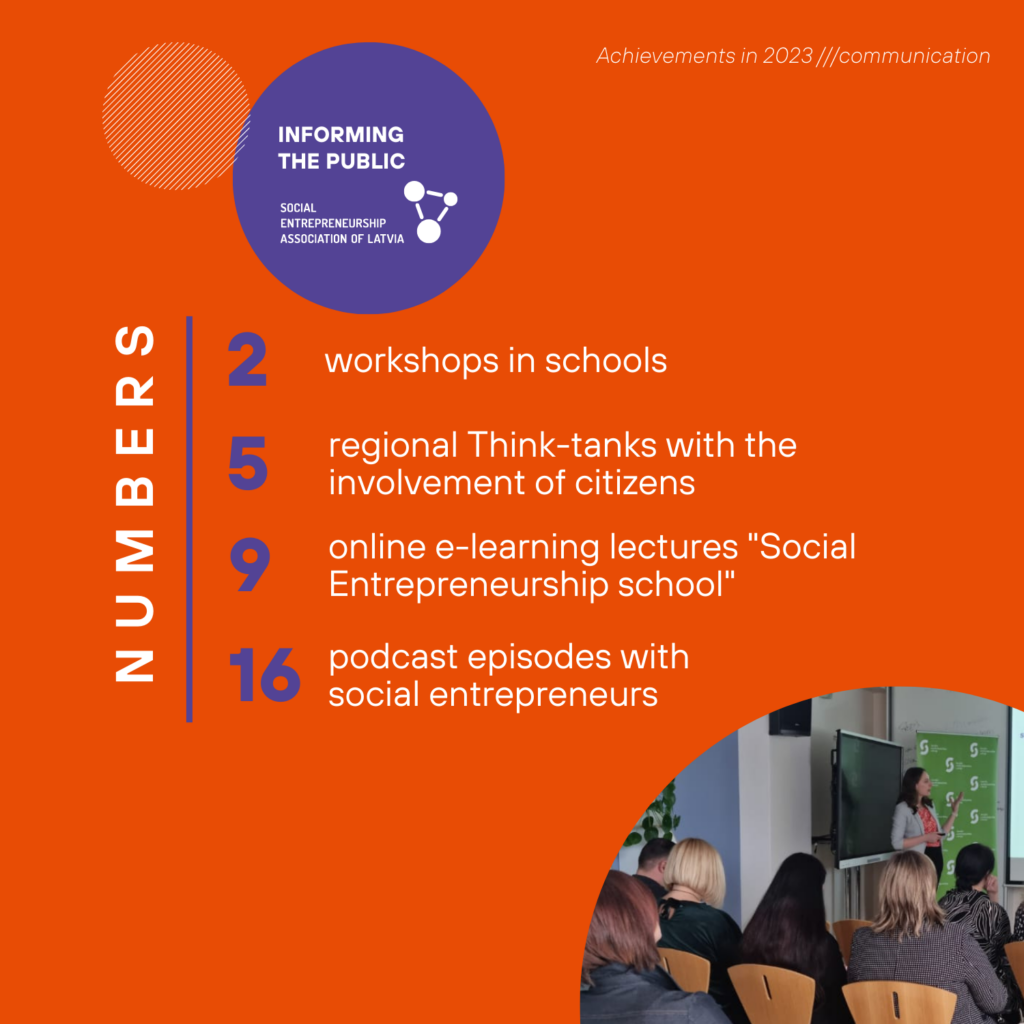
Thanks to everyone involved for a busy and productive 2023, and here’s to a successful cooperation in 2024!
The social impact of public procurement - can the EU do more?
The aim of this study is to present the possibilities offered by Directive 2014/24/EU on public procurement for the achievement of social goals and to analyse how these possibilities have been transposed into national law and implemented by contracting authorities across the EU. Another aim is to identify obstacles to the use of existing provisions and make recommendations with regards to possible future EU action.
This document was provided by the Policy Department for Economic, Scientific and Quality of Life Policies at the request of the Committee on Employment and Social affairs (EMPL Committee).
Seven years after its entry into force, it is legitimate to wonder what kind of social impact this Directive might have produced and to what extent SRPP is used in the EU. Until now, there has been no evaluation of this Directive from the European Commission. This study attempts to fill this gap and provide some answers on the state of play of SRPP in the EU.
